♀️ The Trailblazing Women of Wall Street
Women have long shaped Wall Street—even when history tried to write them out.


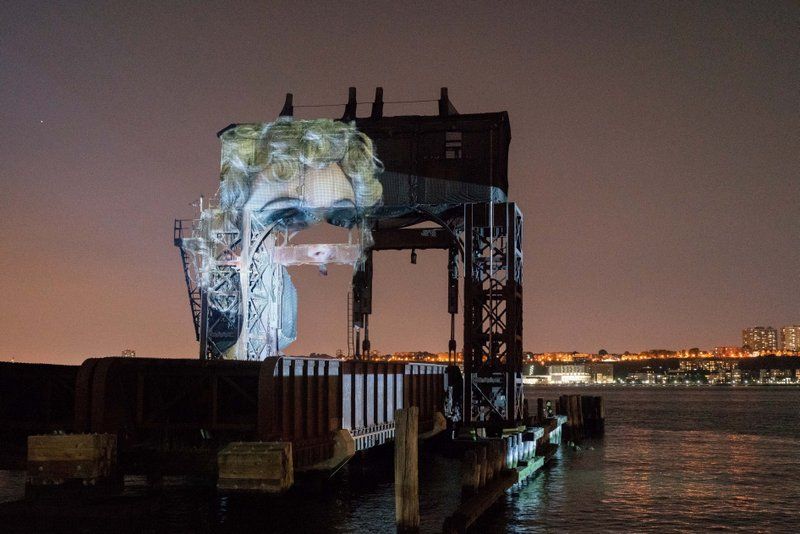 Tony Oursler, Tear Cloud (in-process projection of Pearl White), 2018. Multi-channel installation, courtsey of the artist. Photo by Tony Oursler Studio
Tony Oursler, Tear Cloud (in-process projection of Pearl White), 2018. Multi-channel installation, courtsey of the artist. Photo by Tony Oursler Studio
October is here and the cool weather makes it a great time to get out in the city. From various oversized art installations coming your way, to the annual Open House New York, Archtober and Art in Odd Places events, to a Mile Long Opera coming to the High Line, and more, there’s a big spectrum of art and architecture to take in.
Read on to check out the must-see art installations in New York City this month:
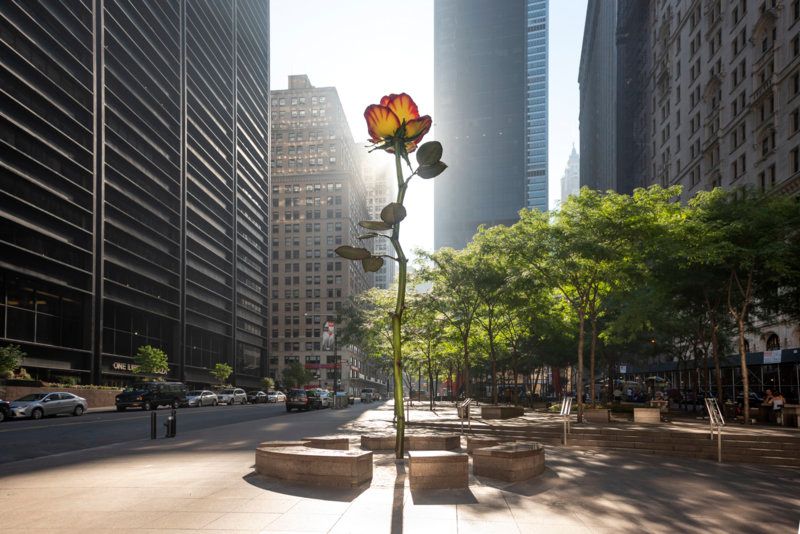
Photo by Timothy Schenck, courtesy Galerie Buchholz, Berlin/Cologne/New York
Rose III, a brand new permanent installation, was unveiled on September 16th in Zuccotti Park in Lower Manhattan. The oversized rose is designed by artist Isa Genzken, who also did the two orchids at the 5th Avenue and 59th Street entrance to Central Park in 2016 for Public Art Fund. The rose stands at over 26 feet and is made of painted steel, based on an actual rose chosen by the artist. Genzken has a significant body of work dedicated to New York City and finds inspiration from its forms. She has said, “To me, New York had a direct link with sculpture…. [It] is a city of incredible stability and solidity.” The form of the rose evokes the skyscraper, but the work is also commentary on the object itself. According to a press release about the work, “For Genzken, also of interest is how these shifting meanings relate to shifting values: how roses were once a rare luxury item, and are now a widely available, nearly ubiquitous commodity.”
As suggested by its name, Rose III is the third in the series by Genzken – the first is in a private home, the second was on display at the New Museum from 2010 to 2013, and it is now part of the permanent collection at The Museum of Modern Art, viewable in the sculpture garden.

Tony Oursler, Tear the Cloud (in-process projection of Pearl White), 2018. Multi-channel installation, courtsey of the artist. Photo by Tony Oursler Studio
One of our favorite pieces of waterfront industrial infrastructure is the transfer bridge or gantry, and the 69th Street Transfer Bridge in Riverside Park is one of the earliest we documented. We are excited to share that this month, that bridge will have a video projection called Tear the Cloud by Tony Oursler, a pioneer of video art in the 1980s, in an installation sponsored by Public Art Fund.
According to the press release, the work will “explore the transitory space between the river and the city,” with Oursler sourcing from many influences on the Hudson River and Hudson Valley, including “the Hudson River School (the country’s first regional artistic movement which gave birth to the initial land preservation movement), social media bots, inventor Samuel Morse’s final painting, The Muse, The Headless Horseman, IBM’s chess-playing computer Deep Blue, Mary Rogers’ infamous murder at Sibyl’s Cave in New Jersey, the 19th century utopian society of Oneida, and experimental music developed in the South Bronx and Lower Manhattan, among others.”
Tony Oursler:Tear of the Cloud will be on view October 10 – 31, Tuesday – Sunday, 7:00pm – 10:00pm in Riverside Park South (between 68thand 70th Streets) near Pier I on New York City’s Upper West Side.
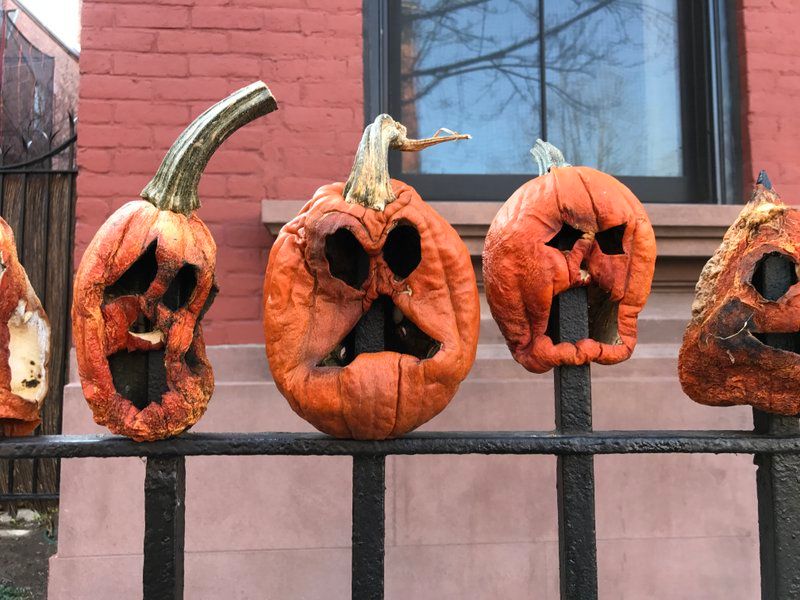
Photo courtesy Jane Greengold
The Halloween Impalement: The Toll of Time, a temporary site-specific art installation on the fence of artist Jane Greengold’s townhouse is back again this year! The artists hopes this year to “impale the most heads ever,” with 274 spikes available. Last year, over 70 pumpkin heads were impaled. After the impalement, the pumpkins are left to deteriorate, leading to a ghoulish aftermath over the course of several weeks.
If you want to participate this year, bring an already-carved pumpkin to the corner of Kane Street and Strong Place in Cobble Hill between 3 pm and 7 pm on October 31.
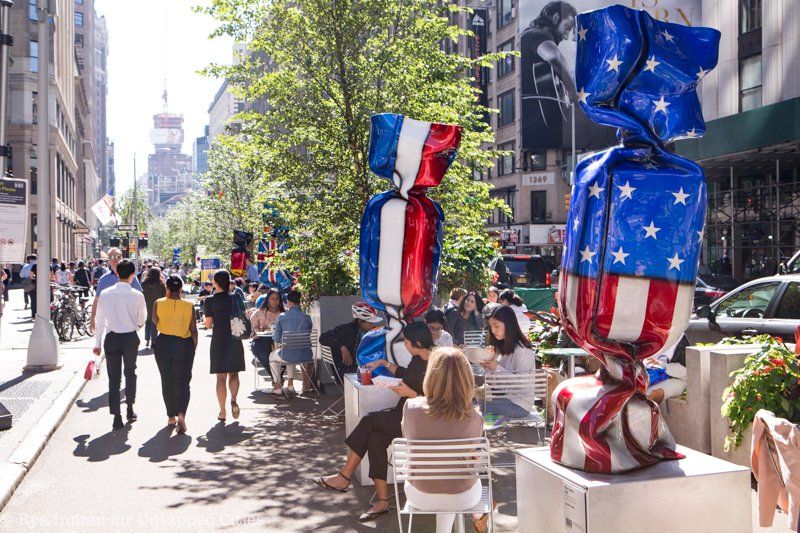
French sculptor Laurence Jenkell‘s Candy Nation, a series of oversized candies with the flags of different countries, was first created for the G20 Summit in Cannes, France in 2011. Now, it will be coming to the Garment District malls on Broadway starting October 3rd, as part of an installation by the Garment District Alliance and the Arterventions program from the NYC Department of Transportation.
The countries included will be the United States, European Union (plus member countries Germany, France, Italy), Great Britain, Canada, Mexico, Brazil, Australia, South Korea, Japan, China, Argentina, India, Russia, Turkey, China, South Africa, Indonesia, and Saudi Arabia.
You can also catch more of Jenkell’s oversized candies inside the Port Authority.
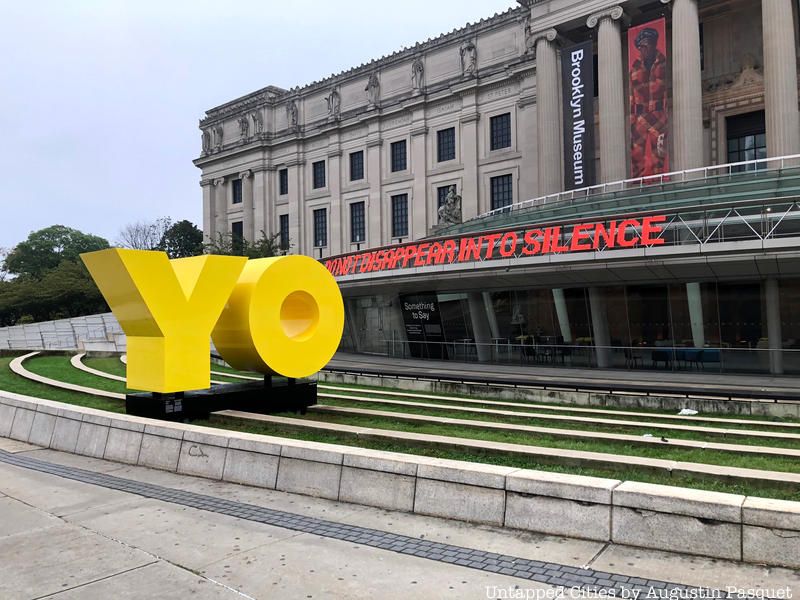
Deborah Kass’ OY-YO sculpture made a splash when it debuted in Brooklyn Bridge Park in 2015. Meant to be seen in both ways, it serves as a welcome point between different cultures. OY-YO spent some time in Williamsburg after Dumbo, and has just arrived at the Brooklyn Museum, joining other works in the Something to Say exhibition of text-based works by Brooklyn-based artists Brooklyn Hi-Art! Machine, Kameelah Janan Rasheed, and Hank Willis Thomas.
According to the press release, “In Prospect Heights and neighboring Crown Heights, OY/YO takes on new meaning, as it speaks to the longstanding, complex, and ever-evolving social dynamics between Black, Latinx, and Jewish communities in the neighborhood. At the Brooklyn Museum, OY/YO will function as a new greeting, welcoming visitors to the museum connecting to a diverse audience, while also saying “hey” to locals.
OY-YO will be on view at Brooklyn Museum until June 30th, 2019.
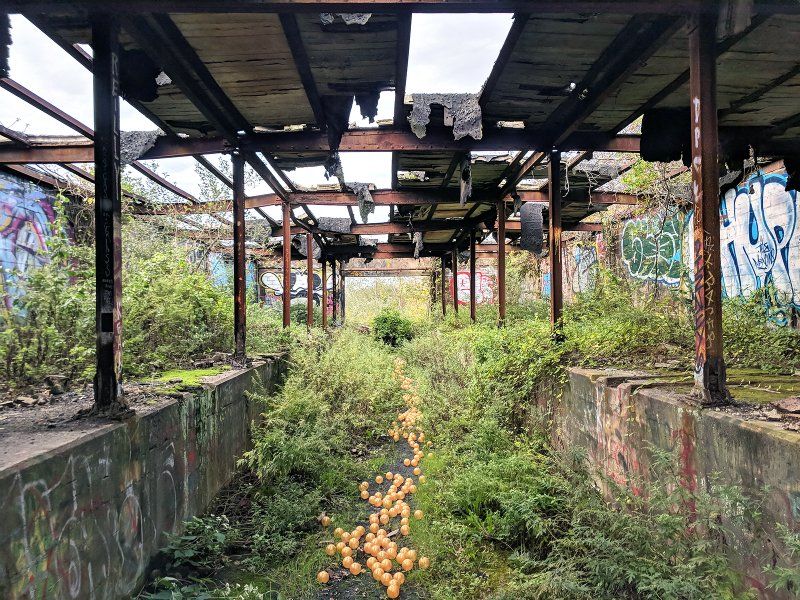
Photo by Aaron Asis
Have a Ball is a site-specific installation by artist Aaron Asis which consists of 1500 gold balls located within an abandoned structure in Fort Tilden National Park. This temporary installation, which went up in the first week of October, is deliberately reminiscent of a recent work at Fort Tilden but created as a counter-statement intended to highlight the unconventional character of abandoned structures — rather than reducing abandonment to something of an artistic backdrop.
 Photograph by Liz Ligon
Photograph by Liz Ligon
For five nights in a row, from October 3-7, 2018, the High Line will feature its most ambitious cultural event yet: The Mile-Long Opera. One thousand singers, from 40 amateur choirs from all five boroughs New York City, will perform one piece across the entire one and a half mile stretch of the High Line. The audience will promenade through the piece, starting at the Gansevoort Street entrance to 34th Street.
At its root, The Mile-Long Opera is a community-engagement project that actively sought a piece that represented a diverse, cross-section of the city, both in terms of the participants and the source material. The subject of the opera looks at the time, 7 o’clock, as a time of important transformations across multiple perspectives.
Pulitzer-prize winning composer David Lang wrote the opera, with poets Anne Carson and Claidio Rankine writing the liberetto. Diller and Lindsey Peisinger serve as co-directors, Donald Nally is the music director. THE OFFICE performing arts + film, The High Line and the Diller, Scofio + Renfro serve as producers. Tickets are standby only at this point, but you can also experience the event in 360 VR. More info here.
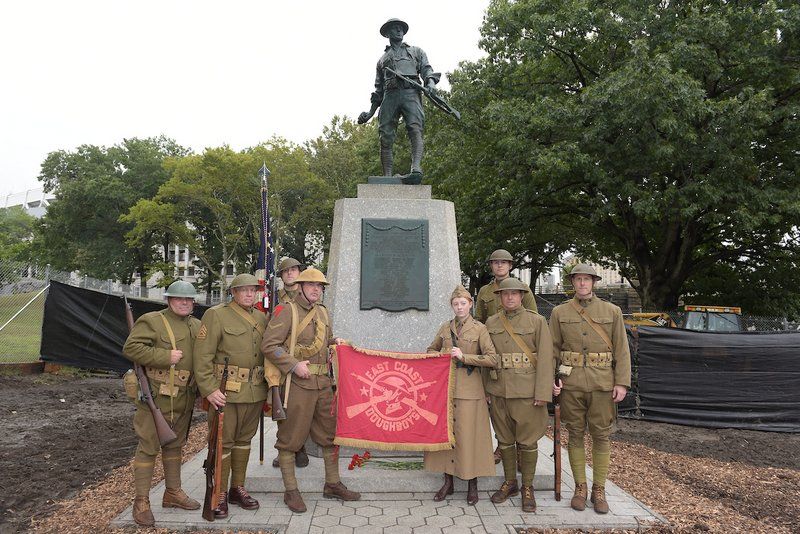
Photo by Malcolm Pinckney/NYC Parks
The historic Highbridge Doughboy Statue was returned to its home in the Bronx on September 28th, with a ceremony that included the World War I Centennial Commission, the East Coast Doughboys (above), local officials and more. Funding for the restoration was provided by NYC Parks’ Citywide Monuments Conservation Program (CMCP), A+E Networks HISTORY, as well as the Centennial Commission.
The Doughboy is seven and a half feet tall, on top of a granite pedestal eight feet tall. The statue, designed by Max Hausle the architect of the Bronx County Courthouse, was erected in 1923 to honor the 21 local Highbridge servicemen who died in WWI. According to Kevin Fitzpatrick, program director, WWI Centennial Committee for New York City and author of World War I New York: A Guide to the City’s Enduring Ties to the Great War, “There are 21 names of men from Highbridge on the restored memorial tablet. Who were these service members from the neighborhood? They were Morris High School graduates, clerks, conductors, electricians, painters, printers, and salesmen.”
According to NYC Parks, “To say that the Highbridge Doughboy has been ‘battle-tested’ is an understatement. In 1974, the honor rolls were stolen, and by 1976 the rifle had been stolen, too. Around that time the sculpture was toppled, with the helmet and arms badly damaged. Prior to the 1970s the sculpture had been moved across the street to Bridge Park, adjacent to the Washington Bridge; after being vandalized, the sculpture was moved permanently into storage for safekeeping.”
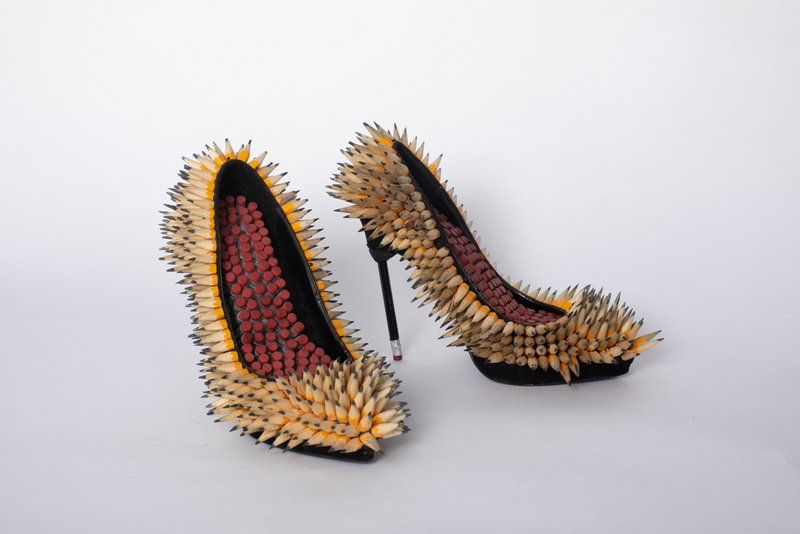 Image courtesy SVA NYC
Image courtesy SVA NYC
From October 4-6, Madison Avenue BID will host Obsessorize, a fashionable accessories-inspired public art installation in partnership with the School of Visual Arts (SVA)’s 3D Design department, building on a New York Fashion week exhibition in Fall 2016 along Madison Avenue that showcased the intersection of fashion and typography. Obsessorize will stretch 58th Street to 86th Street, with an official unveiling on October 4th at 6 PM in front of Stuart Weitzman at 625 Madison Avenue. 39 participating shops will have extra after hours shopping events from 6 to 8 PM.
Matthew Bauer, the Madison Avenue BID’s president, says that the 2016 exhibition “was the first public art installation showcased along the length of Madison Avenue, and public reaction was strong and enthusiastic. Retailers loved the vibrancy on the sidewalks and the many passers-by that stopped, smiled and took photos of the artworks. Upper East Siders loved the creativity demonstrated by the students. SVA and its students appreciated the opportunity to engage the public with their work in one of most urbane and novel settings in New York.”
In addition to Obsessorize, the 3D Design students also currently have their “One of a Kind” dresses on view at 75 Rockefeller Plaza, and their “Chairs that Inspire” on view at the SVA Gramercy Gallery, 209 East 23rd Street.
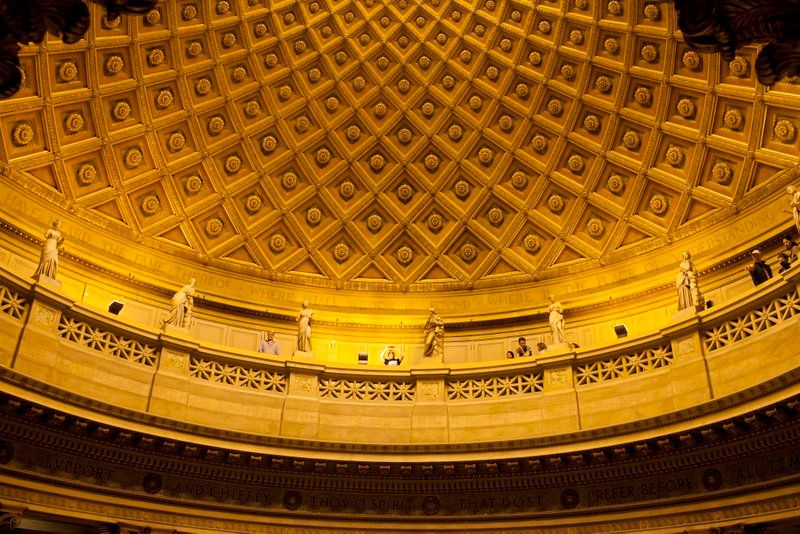
Gould Memorial Library at Bronx Community College. Photo courtesy Open House New York by Jessica Bruah
Open House New York, when the city’s most unique locations opens its doors to the public, is back October 12-14 this year, with 266 participating sites this year (123 require advance reservations). With such exciting sites like the Jefferson Market Library Clocktower, Bronx Community College, Kingsland Wildflower,
the Montauk Club, New York Marble Cemetery, Sunset Park Material Recovery Facility, Ukrainian Institute of America, Westbeth Artist Housing, and more, there’s more than enough to explore this year!You can enter to win a VIP Badge for front of line access to all open-access sites at Open House New York through Untapped Cities, in partnership with OHNY, Brooklyn Based and 6sqft!

Photograph Courtesy of the Center for Architecture
If you want to celebrate architecture all month, then Archtober is for you! The month-long series of events include the “Building of the Day” program, in which a different building each day in New York CIty opens its doors to visitors. Untapped Cities has a special partnership with Archtober to offer our Insiders members the opportunity to attend (for free) an invite-only event opening about the birth of hip-hop architecture, a book talk, an architectural trivia night, an architectural pumpkin carving contest, a lecture about the future of the Tri-State region and one about the future of Governors Island, a video seminar and more.
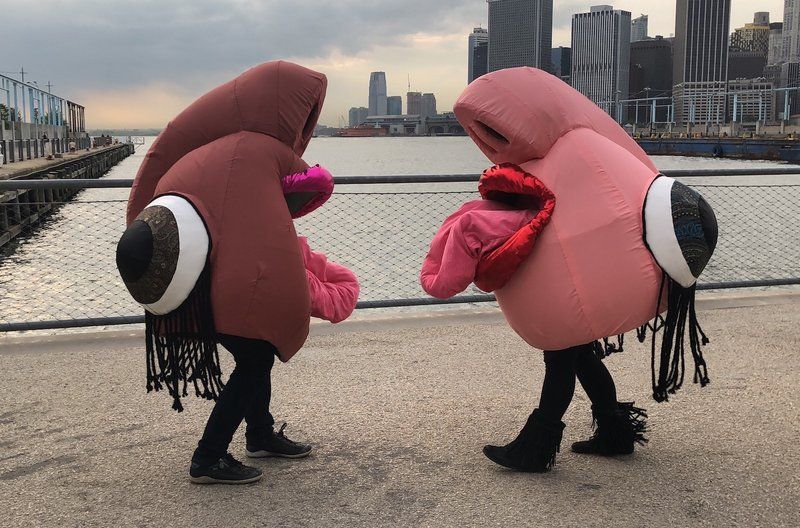
Photo courtesy Art in Odd Places. Credit: Photo of Luiza Kurzyna work by Alex Buly.
This year, the annual Art in Odd Places takes place between October 11 and 14 along 14th Street from Avenue C to the Hudson River. Concurrently, and on a longer time frame, there will be an exhibition at Westbeth Gallery (55 Bethune Street) from October 4 to 27. This year focuses on work by female artists (women, female identifying, non-binary artists, and feminist collectives) on the theme BODY, which “explores agency, politics, and status of the ‘other’ in an urban environment.”

Untapped Cities is a media partner of this year’s 2018 Historic Districts Council Landmark Lion Award, which will honor Boston Valley Terra Cotta, Friends of Terra Cotta and the ceramics company Gladding, McBean, at Grand Central Terminal‘s Oyster Bar, Untapped Cities on October 24th.
In celebration, we are offering two tickets to our VIP Tour of the Woolworth Building with the building architect’s great-grand daughter Helen Post Curry. You can win by uploading and tagging photos of New York City’s gargoyles with the hashtag #nycgargoylecontest and following @untappedcities and @hdcnyc on Instagram. Enter from now until October 17th.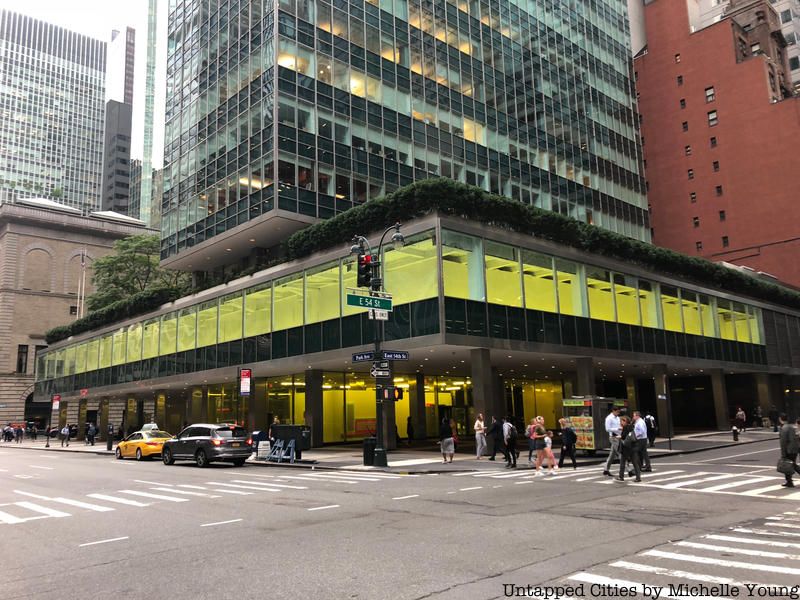
Through December 2018, artist Peter Halley has bathed the lower level of the iconic Lever House in yellow light – similar to what Halley did at Schirn Kunsthalle in Frankfurt, Germany. The exterior takeover will be part of an exhibition curated by the Lever House Art Collection that will take over the lower two floors of the building.
In this two-floor immersive installation, Halley uses the circuit-like compositions of his paintings as inspiration for the lobby’s layout, inviting viewers to feel as if they are walking through the space created by one of his paintings. “The installation is foremost a series of changing scales. The sweeping band of yellow light on the second floor can be seen at night from blocks away. The paintings in the first-floor lobby address the viewer at street level. Then within the lobby, the structure I built to support the paintings has an interior passageway, leading into two hidden rooms, invisible to passersby on the street,” says Halley. The exhibition includes six large shaped-canvas paintings as well as a sequence of hidden digitally-generated mural works.
The Lever House Art Collection has previously featured the work of Jeff Koons and a bronze union rat.
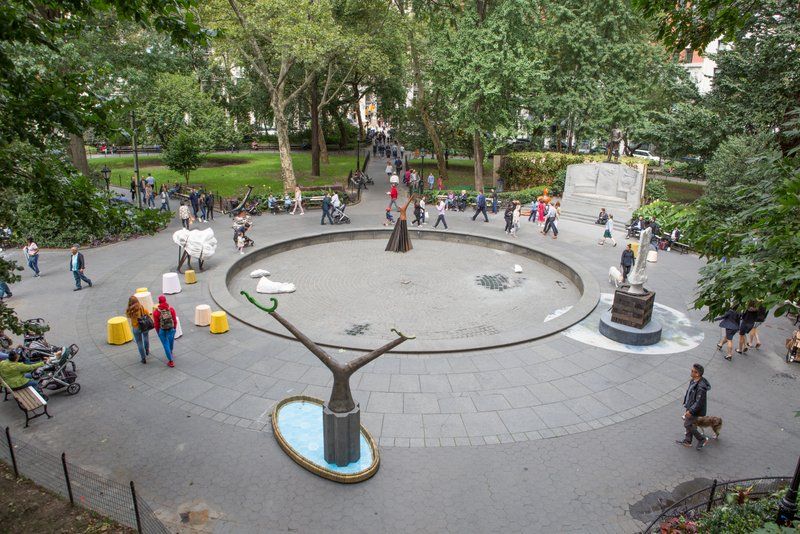 Photo by Rashmi Gill courtesy Madison Square Park Conservancy
Photo by Rashmi Gill courtesy Madison Square Park Conservancy
Until April 28th, 2019, Madison Square Park will turn its main plaza into a sculpture court with works in wood, porcelain, and cast-iron. The site-specific installation by Arlene Shechet entitled “Full Steam Ahead” hopes to overturn the traditional notion of a sculpture court. According to the Madison Square Park Conservancy, Shechet’s work “riffs on the concept of the staid sculpture court—a mainstay of traditional museum display—as a cloistered experience.” Instead, the human-scale sculptures invite gathering, interaction and seating. Arlene Shechet stated about the project: “My hope has been to reimagine the hardscape of the Park with delight and surprise. New Yorkers rely on the sidewalks, the pavement, and the street as the core of their urban lives. Full Steam Ahead becomes a lively and human amphitheater, softening the hardscape through sculptural intervention evocative of 18th-century garden landscapes.”.
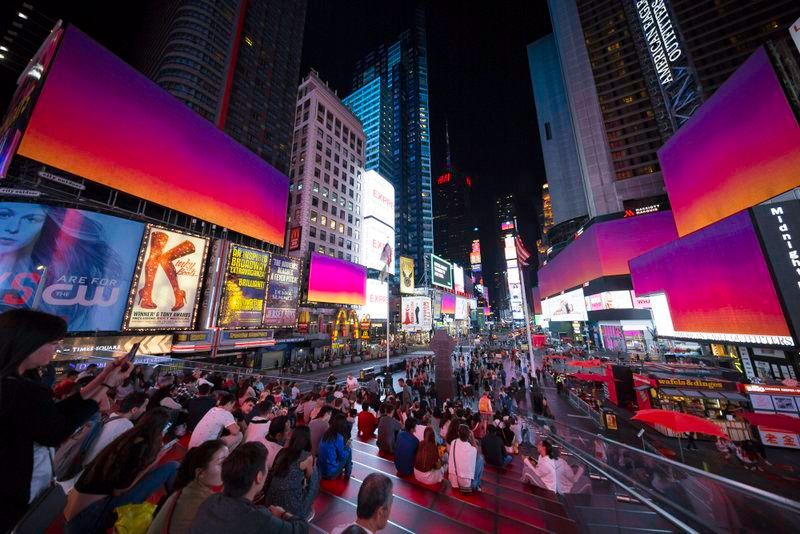 Courtesy of Ka-Man Tse for Times Square Arts
Courtesy of Ka-Man Tse for Times Square Arts
Times Square’s October Midnight Moment features work bythe Instagram name of advertising creative director Isabel Martinez. Quite a departure from the usual types of work displayed at Midnight Moment, this work contrasts with the hectic Times Square environment. According to the Times Square Arts, the work is “a color gradient into motion, shifting slowly from a deep midnight blue through a spectrum inspired by the sky during sunrise. At three minutes to midnight, when the sky is dark but the screens are bright in Times Square, you can look up, breathe deeply and watch the darkness become the light. This digital work, a natural occurrence at an unnatural time, invokes a physical experience — a calm, contemplative moment in one of the most frenetic locations in the city that never sleeps. Simultaneously a visual poem and a minimalist ode to ephemeral experience, the video installation uses the power of color to raise questions about time and space.
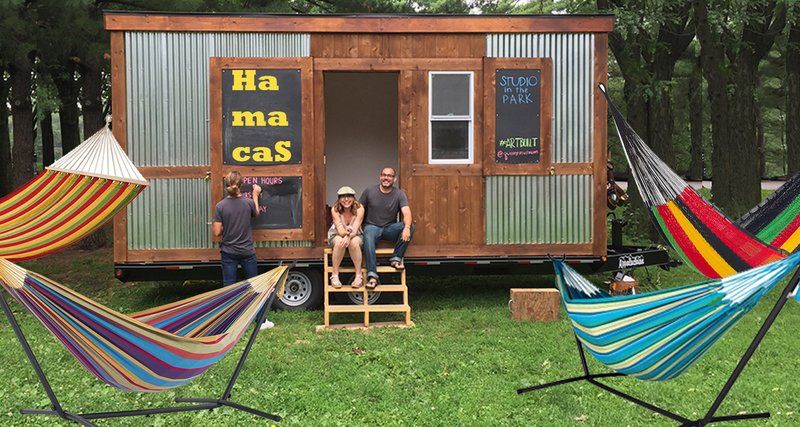
Rendering courtesy Queens Museum
From October 1st to November 15th, artist LIene Bosque brings handwoven hammocks and looms to Flushing Meadows-Corona Park, as part of the 2018 ArtBuilt Mobile Studio in the Park artists in residence program. According to the Queens Museum, the work “aims to capture the physical and emotional displacement experienced by immigrants in the United States. It will consist of free English and Spanish language workshops in which participants engage in a collective hammock weaving installation.”
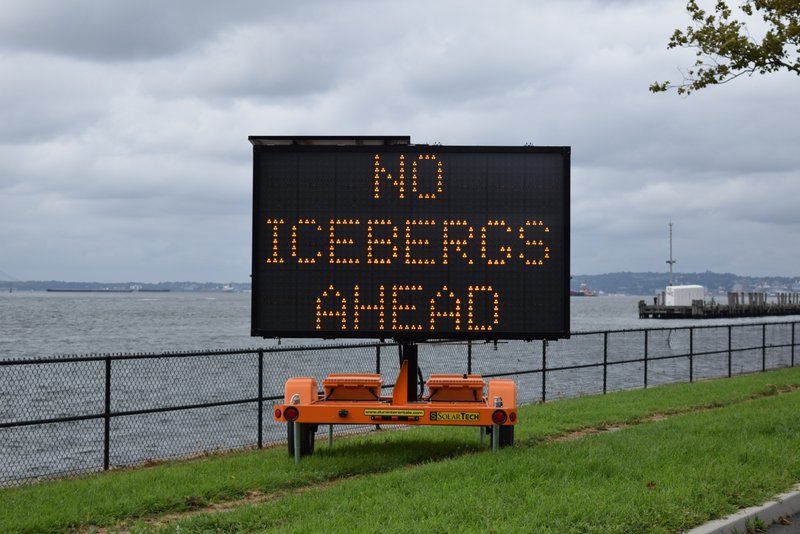 Courtesy of Stuart Faith and the Climate Museum
Courtesy of Stuart Faith and the Climate Museum
Until November 6th, Climate Signals, an initiative of The Climate Museum, will still be up across the five boroughs and Governors Island,, including in areas particularly vulnerable to sea level rise. The project features traffic signs with climate change messages displayed ranging from the humorous (NO ICEBERGS AHEAD) to the sobering (5000000 CLIMATE REFUGEES). Part of the project is also a Climate Museum Hub, the first temporary space for the organization, at the Admiral’s House on Governors Island.
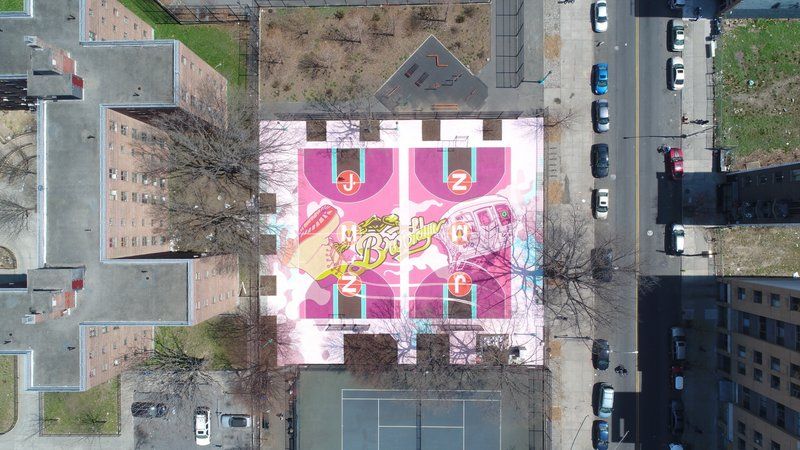 ASKEW ONE at Marcy Playground, courtesy of Jason Elbourne / Courtesy of NYC Parks
ASKEW ONE at Marcy Playground, courtesy of Jason Elbourne / Courtesy of NYC Parks
Street artist ASKEW ONE was commissioned to paint the entire basketball court at Marcy Playground in Bedford-Stuyvesant, Brooklyn. The piece is called “Artwork Inspired by The Last O.G. on TBS” referencing the television show from Jordan Peele (of Get Out) starring Tracy Morgan. You can see how the visual inspiration is derived from the cover image of the series, including the pink color palette and the Brooklyn chain necklace. The rest of the artwork references the JMZ subway line.
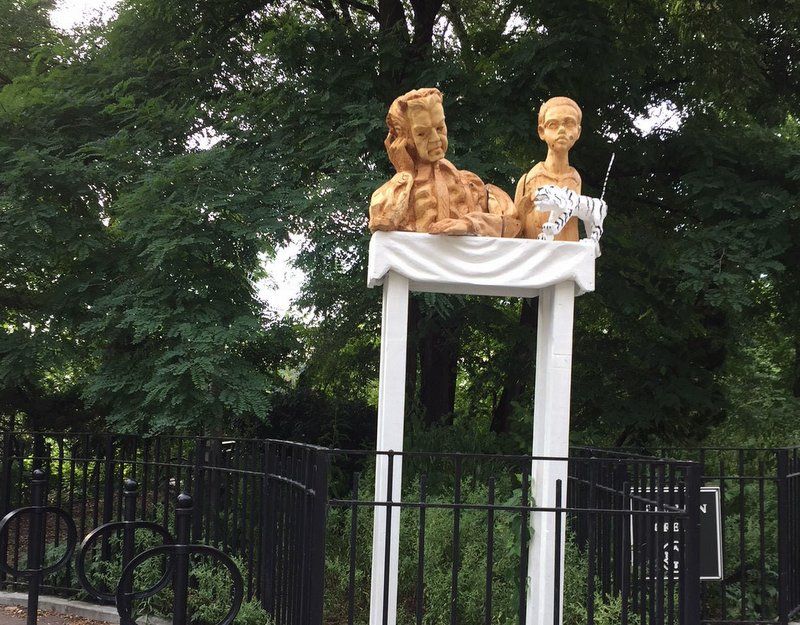
Photo courtesy NYC Parks
Until November 14th, this fun exhibition in Sherman Creek Park features six carved wood and mixed media sculptures by artist and psychiatrist Peter Bulow. According to NYC Parks, Bulow “has created a garden within a garden: a personal garden of his childhood, populated by monumental statues of his family. Visitors will find his great aunt Trude and great uncle Oskar from Berlin, his Hungarian mother Giselle, depicted when she was living in India and wearing a sari, and the artist himself as a five year old boy next to Oskar, wearing identical suspenders, showing a tiger he had made out of clay.”
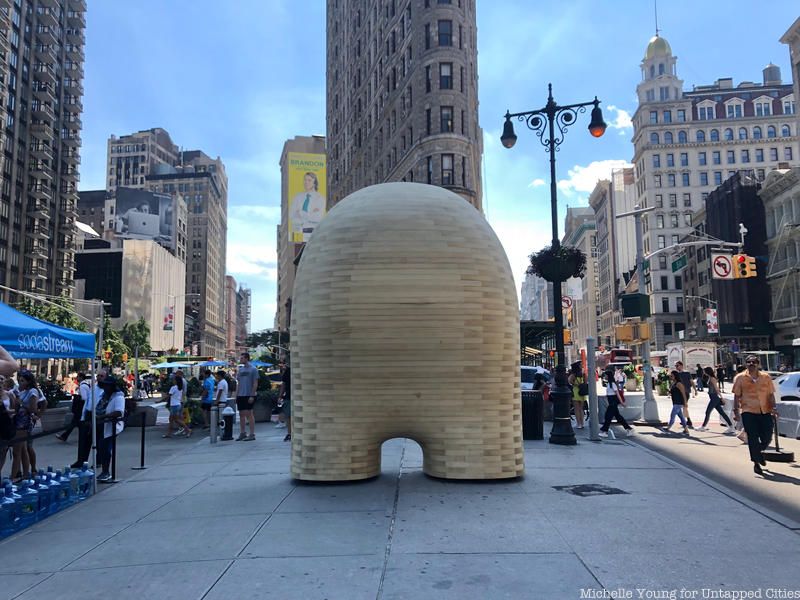
This installation at Flatiron Plaza North from mid-August is a public art complement to the latest exhibition at the Noguchi Museum in Long Island City. Made of accoya wood, “Link” by Jorge Palacios was inspired by the sculpture of Isamu Noguchi and this work is intended to “explore the relationship between scale and civic life,” according to the Museum. The Spanish artist, who has studios in New York City and in Spain, has nine sculptures on view at the Noguchi Museum that “explore the laws of physics and motion on microscopic and macroscopic levels.”
Link by Jorge Palacios will be on view until November 6, 2018. Palacios’ exhibition at the Noguchi Museum will be up until January 20, 2019.
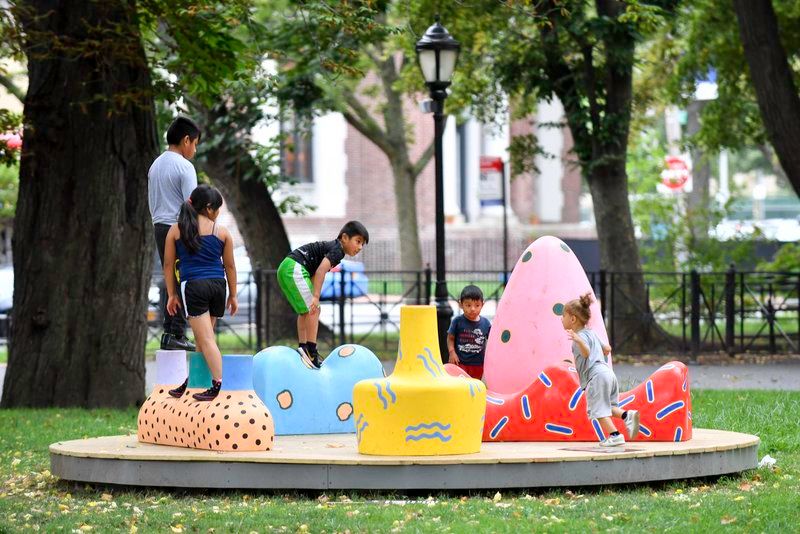 Adam Frezza & Terri Chiao, Stick Stump & The Lawn Lumps, courtesy of NYC Parks
Adam Frezza & Terri Chiao, Stick Stump & The Lawn Lumps, courtesy of NYC Parks
It’s always great when outdoor art doubles as functional seating, and Stick Stump & The Lawn Lumps by Adam Frezza & Terri Chiao in Tappen Park on Staten Island does just that with colorful and whimsical shapes intended for the visitor to engage with. The work is part of the UNIQLO Park Expressions Grant, with ten works in NYC Parks around the five boroughs.
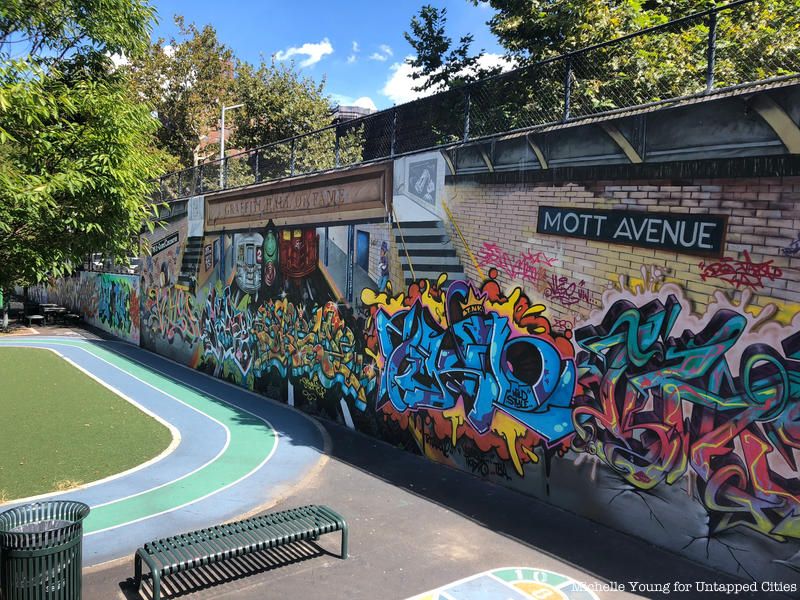
The Graffiti Hall of Fame in El Barrio received its annual renewal again in late August. The street art hotspot in the playground of the Jackie Robinson Educational Complex between 106th and 107th streets is not usually open to the public, but each year, the executive director of the Hall of Fame, James Top, invites artists to execute new work on a specific theme. This year, the theme was “The Subway Edition,” focusing on the subway in the late 1980s. Read more about the Graffiti Hall of Fame here.
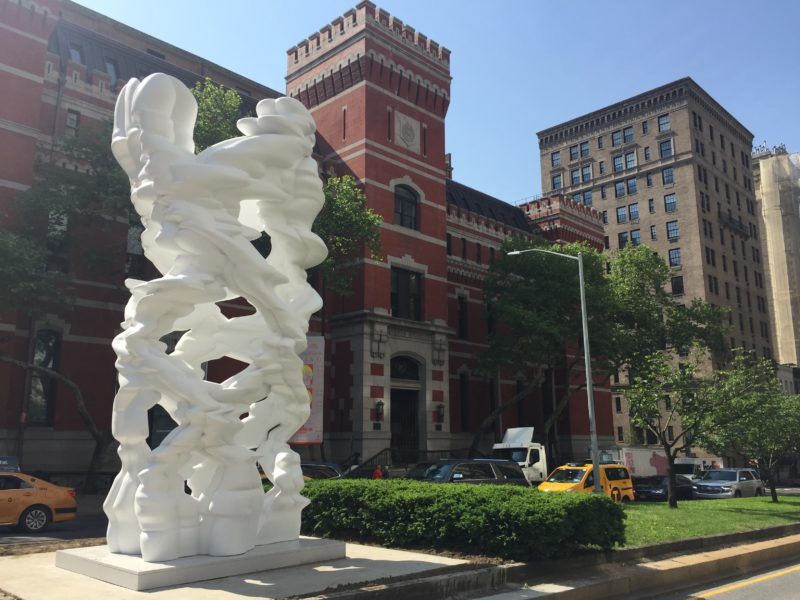
Photo courtesy of NYC Parks
Situated on the Park Avenue Malls between East 52nd Street and East 79th street are five immense art pieces that make up Tony Cragg’s Monumental Sculptures, which will be on view through the end of the month. These sculptures are located at 52nd, 57th, 67th, 72nd, and 79th Streets, and both enhance and stand out from the surrounding urban landscape. The pieces are made out of materials such as fiberglass, stainless steel, and bronze, and are meant to “defy gravity while giving the impression of upward motion and kinetic energy. In 2015, Tony Cragg had an installation in Madison Square Park.
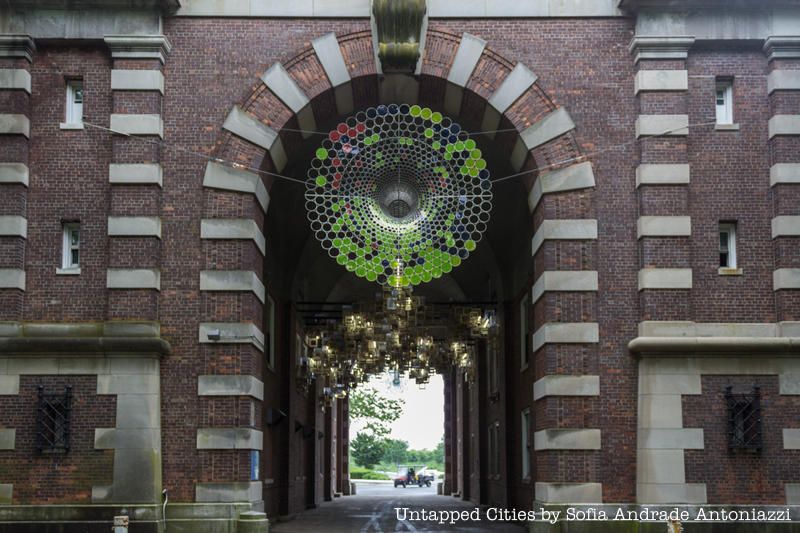
Never Comes Tomorrow by Jacob Hashimoto in the Liggett Hall archway
It’s the last month to see Jacob Hashimoto’s site specific art installations on Governors Island. In the archway of Liggett Hall (a former Army barracks building that is the size of the Chrysler Building on its side), is an installation made of hundreds of wooden cubes and enormous steel funnels. The work, entitled Never Comes Tomorrow is meant as a threshold that connects Governors Island’s Historic District and the new parks, which include The Hills.
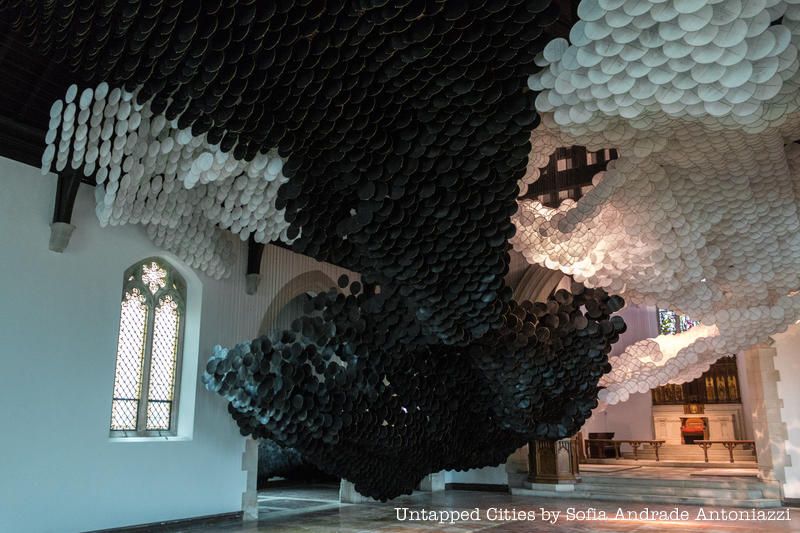
Eclipse, also by Jacob Hashimoto in the St. Cornelius Chapel on Governors Island
Another work by Hashimoto, Eclipse, is located in the St. Cornelius Chapel, featuring thousands of rice paper kites that adapt to the architecture of the historic space, while obscuring the elements. Eclipse was originally installed at the 57th Venice Architecture Biennale at the Palazzo Flangini.
The two installations will be viewable until October 31st this year.
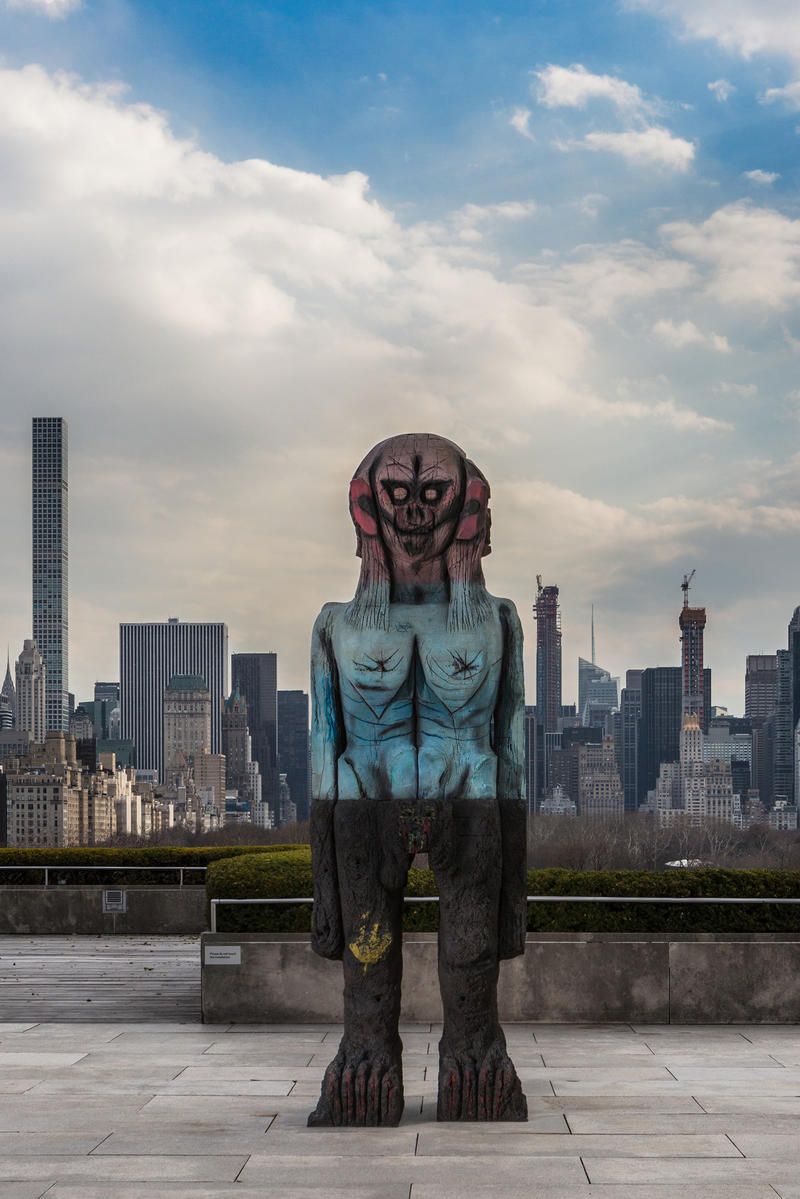 Image by Hyla Skopitz courtesy The Metropolitan Museum of Art
Image by Hyla Skopitz courtesy The Metropolitan Museum of Art
The Metropolitan Museum of Art’s rooftop site specific installation, titled We Come In Peace, is on view to the public until October 28th. Created by Pakistani artist Huma Bhabha, this rooftop installation is The Met’s sixth in a series of site specific commissions for the outdoor roof space. The sculptures consist of the 12-foot-tall five-headed intersex figure “We Come in Peace,” and the 18-foot-long prostrate Benaam — an Urdu word that translates to “without name.”
We Come in Peace borrows its title from the classic American science-fiction film The Day The Earth Stood Still (1951)

, a tale of first contact between humans and aliens. The sculptures are cast in bronze, but were initially handcrafted to scale by Bhabha using ephemeral materials, such as cork, Styrofoam, air-dried clay, and plastic.]
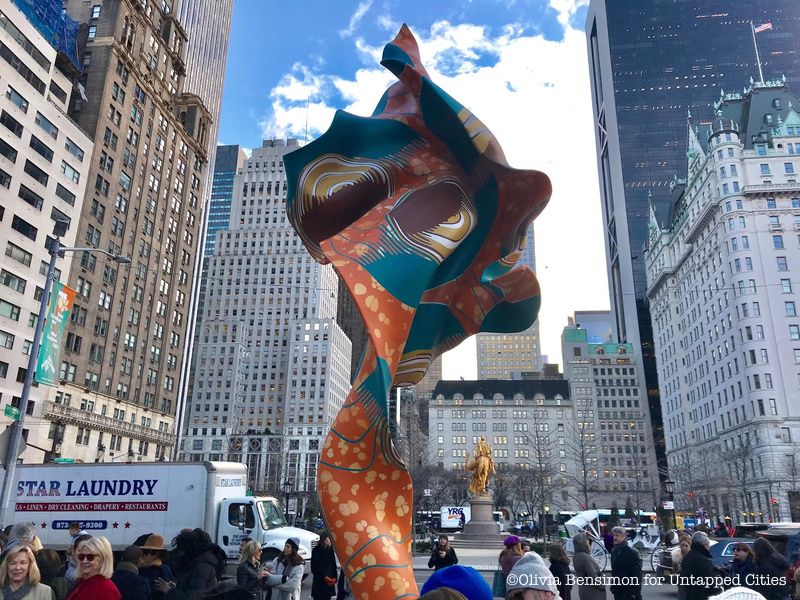
Until October 14th, you can still view British-Nigerian artist Yinka Shonibare MBE RA‘s Wind Sculpture (SG) I, a part of his Wind Sculpture series, in the Doris C. Freedman Plaza, which marks the southeast entrance to Central Park.
Shonibare, one of the best-know contemporary artists in Britain, refers to himself as a “cultural hybrid”, resulting from his ties to both Nigeria and England overlaid with the web of global relations that have stemmed from politics and trade that have shaped his upbringing and his art. In Wind Sculpture (SG) I, Shonibare took the visual of a piece of fabric blowing in the wind and rendered it into a piece of solid fiberglass. The monumental sculpture features a hand-painted pattern inspired by Dutch wax batik print fabric in order to evoke what Shonibare himself refers to as “multilayered identities.”
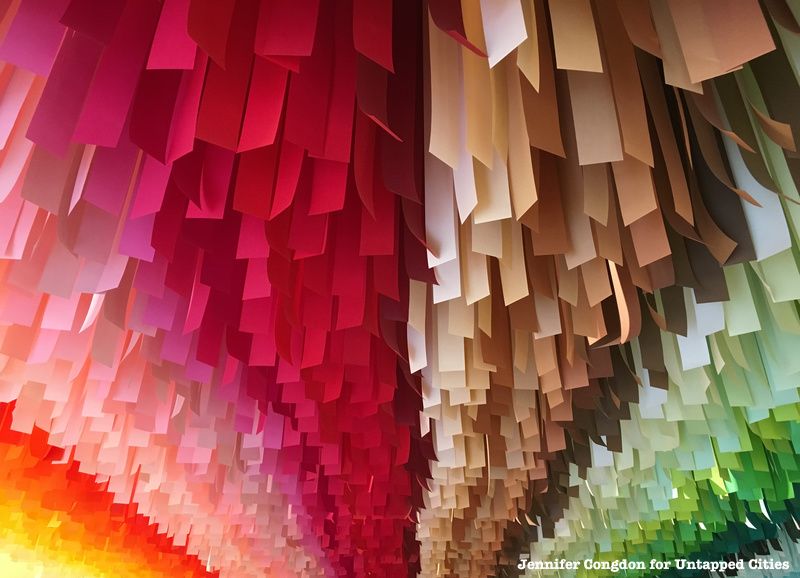
Display in the lobby of Color Factory
Mid last month, Color Factory, an interactive exhibit that celebrates color and creativity, debuted in SoHo with a new color palette curated from the streets of New York. Their goal is to encourage people to engage with color in a personal manner, one that prompts them to reflect on the colorful aspects of everyday life, from the purple flowers at the bodega to the orange objects of a construction zone, which are just two sources of Color Factory’s palette.
Color Factory consists of 16 participatory installations, including an enormous blue ball pit in which diving in is highly encouraged, a dance floor, and an interactive flowchart quiz that reveals your secret color. The exhibition fun even continues outdoors; Color Factory provides visitors with a map of 23 local businesses and organizations with instructions for embarking on your own scavenger hunt to see the colors of the neighborhood and collect some goodies.
Color Factory is a must-visit spot for all color enthusiasts, or just anyone who wants to have some fun, move around, and get some cool photos.
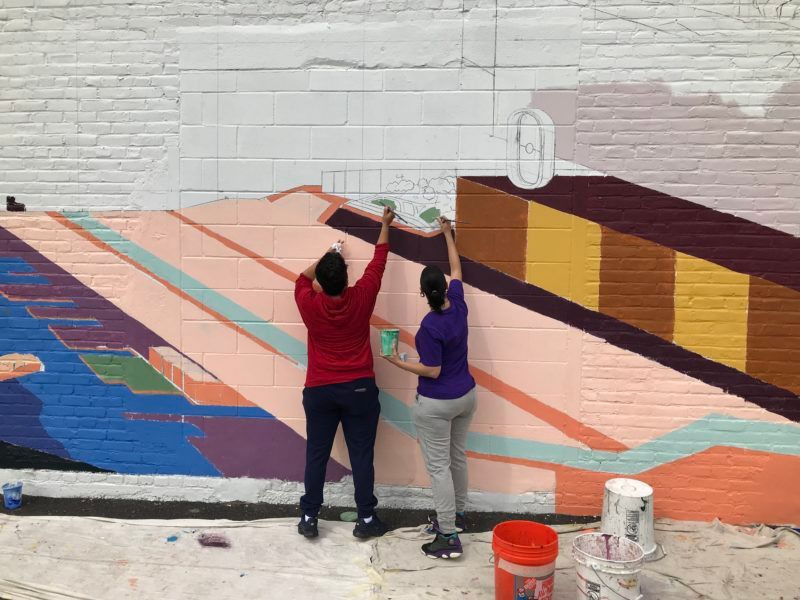
Mural in progress; photo courtesy of Iris Garcia and Sunshine Sachs
The New York City Economic Development Corporation (EDC) recently teamed up with Groundswell, a non-profit organization that connects artists and local communities, to create a new mural in Bush Terminal Park to beautify the Sunset Park neighborhood. The theme of the mural is about accessing the waterfront, both the working, industrial aspects and its natural beauty. Brainstorming for the mural began when the EDC held a visioning session to talk about what the theme means to them, and the imagery that they believe must be represented.
The mural was unveiled on September 7 and can be accessed through the park entrance at 50th Street and First Avenue in Brooklyn.
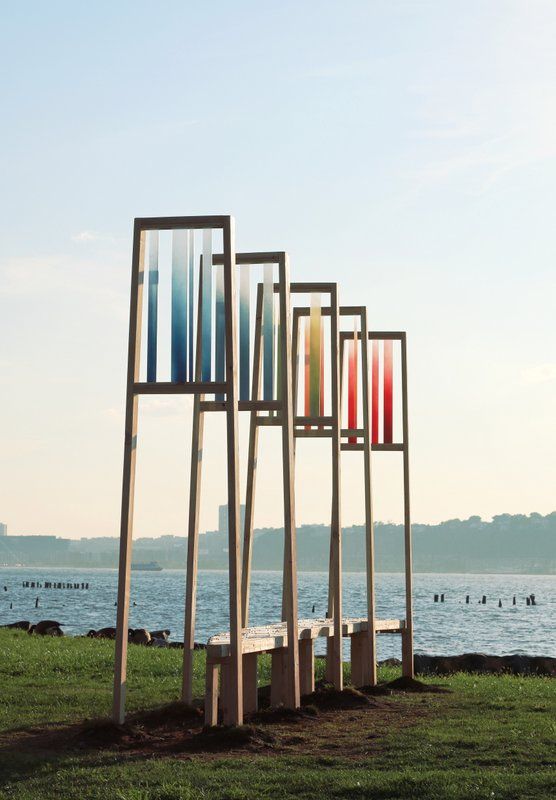
Photo courtesy Sarah E. Brook
Viewfinding, a large-scale public art installation in Riverside Park by Gowanus-based artist Sarah E. Brook, will feature a series of reclaimed lumber and cast-acrylic panels, with engraved text written by 26 queer-identified poets. The acrylic material is selected for its translucency and will shift in color depending on the sunlight and time of day. The poets selected include not only established ones, but also not yet published ones as well.
Viewfinding will be located along the Hudson River in Riverside Park at 67th Street It opens on September 9th, with an opening reception, artist talk and poets’ reading on September 22nd, and will be up until August 22nd, 2019.
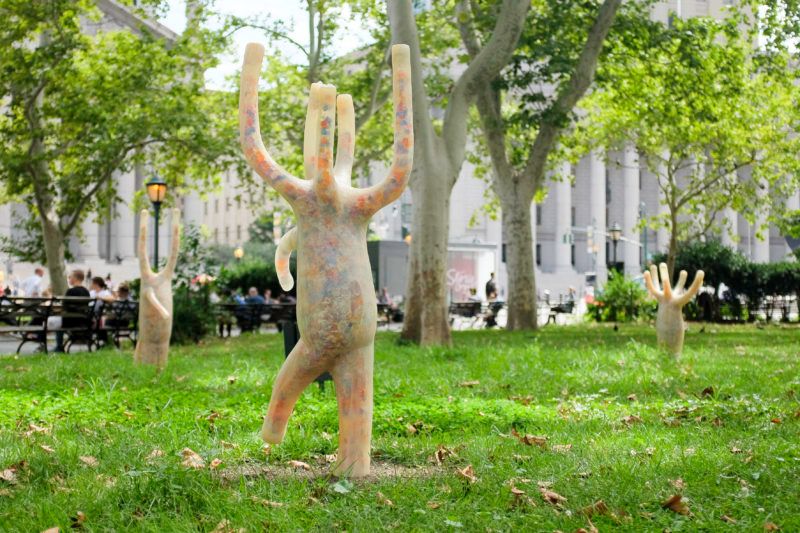
Photo by Daniel Avila courtesy of NYC Parks
Judith Modrak’s Our Memories, recently unveiled in Manhattan’s Thomas Paine Park, is “an evolving audience participatory installation” that aims to “physiologically generate a new collective memory.” The shape of the sculptures is inspired by neurons and contain cavities in which participants place a color-coded stone. These memory stones each represent one of six emotions: joy, anger, love, sadness, fear, and surprise. The aim of the piece is to create a symbolic memorial composed of thousands of individual memories.
Thomas Paine Park is located in the former Five Points and Collect Pond area that is now home to the New York Supreme County Courthouse and the Thurgood Marshall United States Courthouse. The art installation will be up until August 15, 2019.
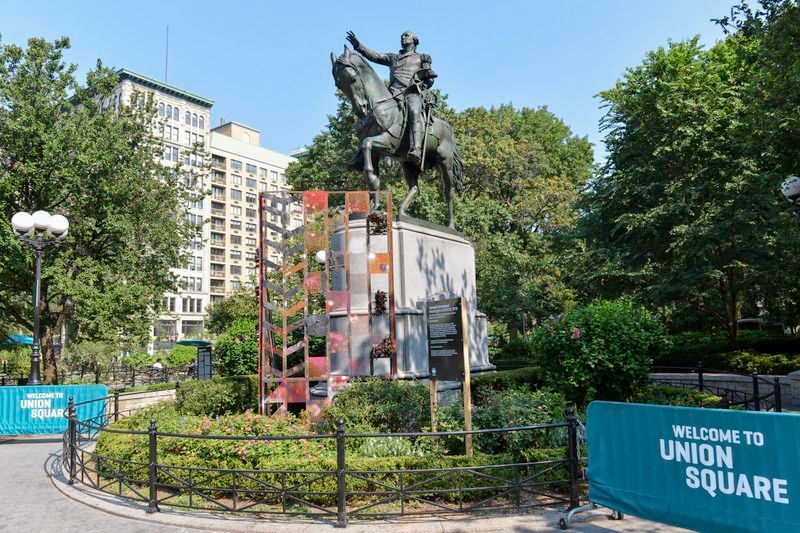
Photo by Daniel Avila/NYC Parks
The George Washington statue in Union Square is considered the first ever statue on New York City parkland, according to NYC Parks. Until October 30th, the work “Washington 20/20/20” by Kenseth Armsted will serve as a companion to the statue. The form of the sculpture is inspired by the colorful frescoes of the homes in Tiebele, Burkina Faso, the royal court of the Kaseena people. The name of the art installation “references the 20% of the colonial population that were enslaved Africans; the 20,000 slaves in New York State in 1776 when Washington retreated from New York City; and the 20% of Washington’s continental army that was African at Yorktown, Virginia, where he was finally able to defeat the British in 1781,” according to an NYC Parks press release.
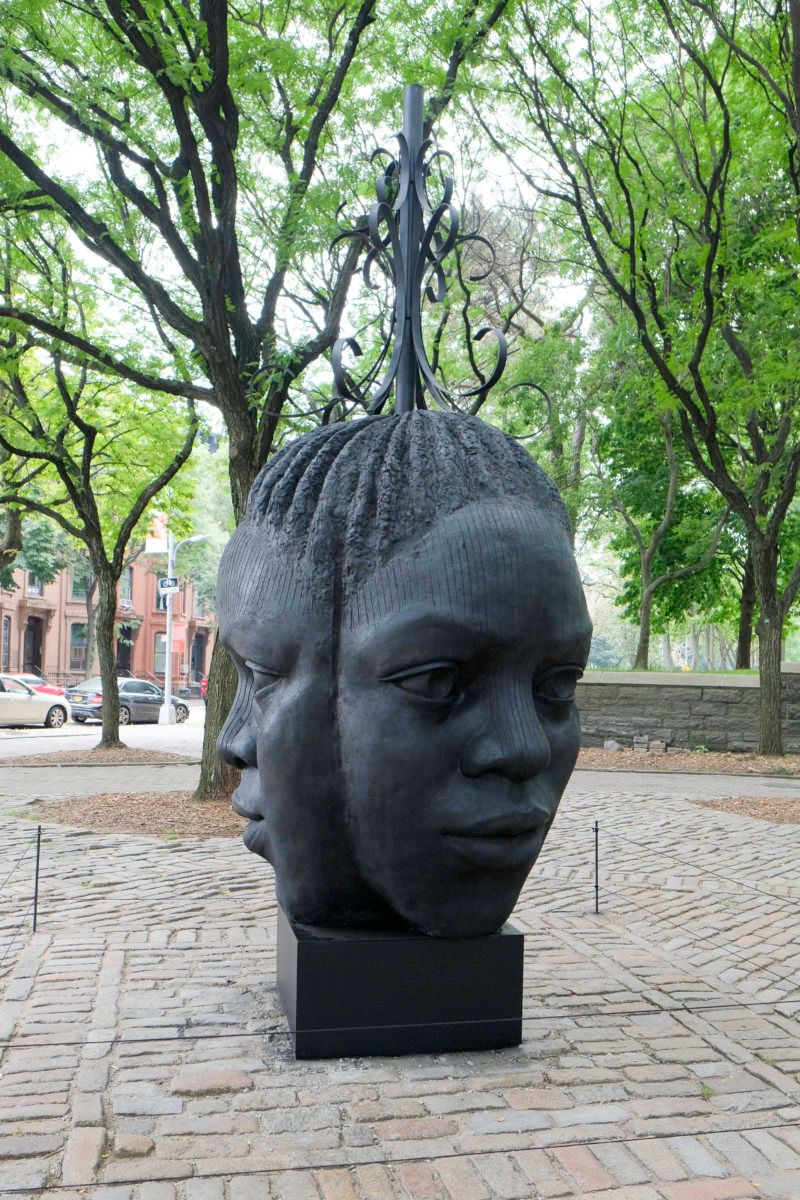
Photo by Daniel Avila courtesy of NYC Parks
On August 25th, Adorn Me, a piece created by UNIQLO Park Expressions Grant recipient Tanda Francis, was unveiled in Brooklyn’s Fort Greene Park. Francis explores African presence in public space as a powerful force of beauty and cultural relevance, drawing on African sculptural tradition and portraiture, as well as Victorian and colonial ornamentation. She seeks to provide “a healing message during a time of heated debate over monuments erected as symbols of oppression and control” in this installation, which will be on view until next summer.
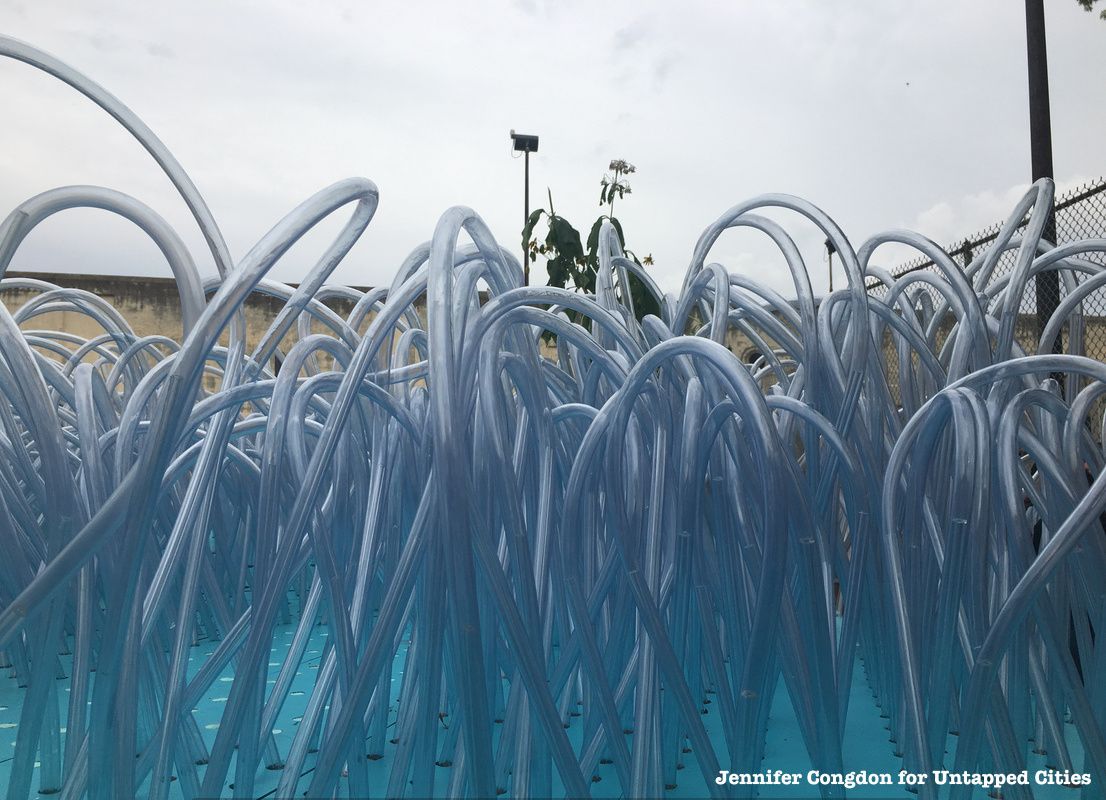
‘Finding Tibbetts’ piece in progress
This month a mobile wetland titled Finding Tibbetts will be traveling around the Bronx to build support for the Daylighting Tibbetts Brook project, an environmental initiative by City as Living Lab to unearth the now-buried Tibbetts Brook in order to minimize water pollution, reduce flooding, and reinvigorate the surrounding ecosystem. Finding Tibbetts will make multiple stops across the Bronx this month on the 7th at Marble Hill and the 14th at the Bronx Green Fair, Church of the Mediator, specifically along the route of the stream, where visitors can see the model cross section of the brook, with water tubes, a real marsh, and an inhabitable section that invites visitors to enter and reflect on their own position in the environment. To get the detailed schedule, sign up for the mailing list at the City as Living Lab website.
Accompanying this project is Bob Braine’s Estuary Tattoos. Braine uses ink to paint the historical map of Tibbetts Brook on participants’ bodies, giving them a temporary piece of artwork on their own body in hopes of fostering people’s connections to the landscape, and most importantly, raise awareness about the daylighting project.
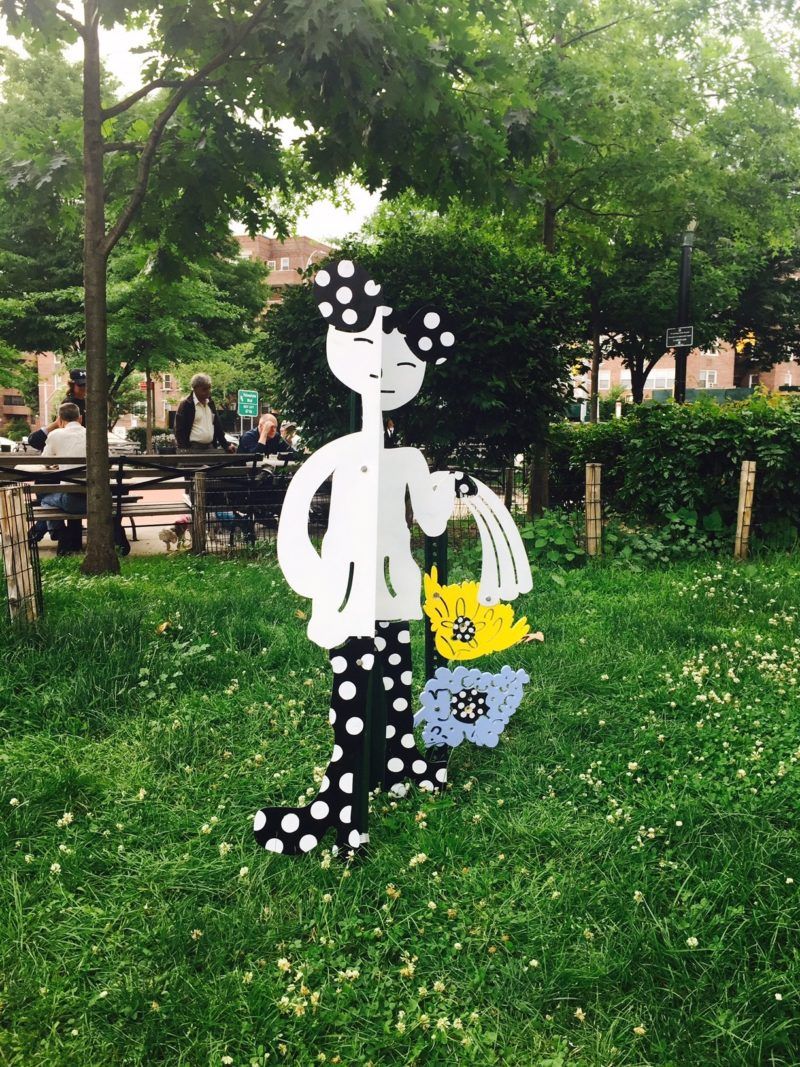
Photo courtesy of NYC Parks
Conceived by Yvonne Shortt and Mayuko Fujino, Functional Bodies is a project that engaged community members, like PS99 students and senior citizens, in its creation in MacDonald Park in Queens. The sculpture, with its creative collaboration with the community, aims to encourage more people to volunteer at the park. The sculpture depicts a girl and a dog, composed of parts that can be used in gardening, along with flowers created by community members of all ages.
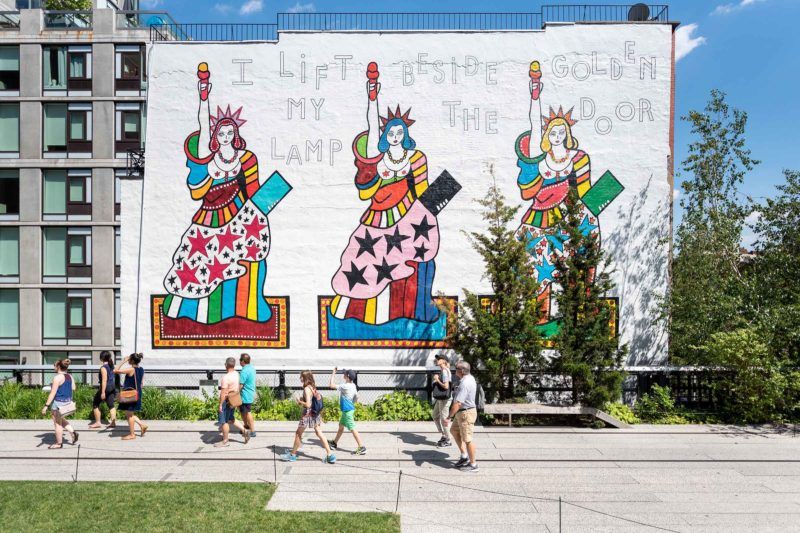
Photo by Timothy Schenck courtesy of Friends of the High Line
Dorothy Iannone’s mural I Lift My Lamp Beside the Golden Door debuted on the High Line near West 22nd Street earlier this year. The mural features three colorful interpretations of the Statue of Liberty accompanied by the words “I Lift My Lamp Beside the Golden Door”. The piece pays homage to the final line of Emma Lazarus’s poem “The New Colossus”, which is engraved on the bronze plaque mounted inside the Statue of Liberty’s pedestal.
Each statue painted in this mural is shedding a single tear, evoking the current polarizing debates surrounding immigration and disputed symbolism of the Statue of Liberty in relation to immigration policy. The work will be on view until March 2019.
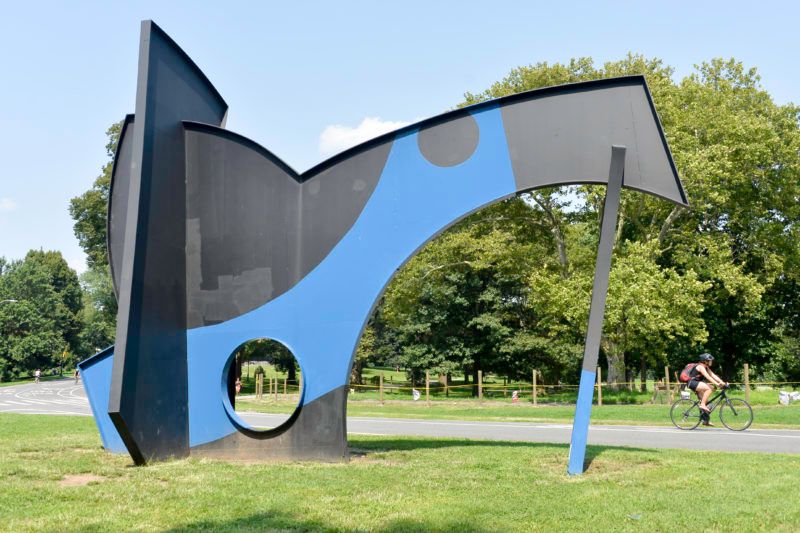
Photo by Daniel Avila courtesy of NYC Parks
Up until October 23rd, Fitzhugh Karol’s Searches and Reaches will be on view in Grand Army Plaza within Brooklyn’s Prospect Park. The installation is composed of two sculptures featuring colorful intersecting steel shapes, which are meant to evoke the lines of stairs and hillsides. The size and abstract nature of the shapes are meant to prompt viewer interaction and remind us of our imprint on the landscape.
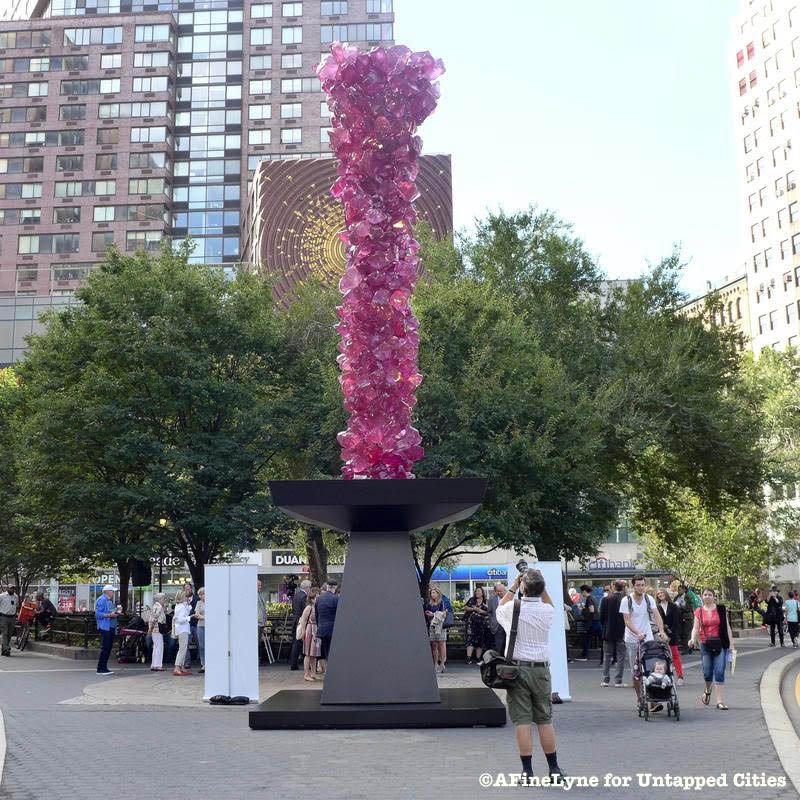
Sculptor Dale Chihuly’s Rose Crystal Tower will be on view only until October 5th in Union Square near 14th Street. The 31-foot tall sculpture, which some believe resembles a stick of pink rock candy, consists of thousands of layers of pink crystals, held together with a glass-like resin. Rose Crystal Tower itself is 22-feet tall, and will be perched on a nine-foot base. The materials used to create this piece are meant to withstand the harshest of urban elements. Rose Crystal Tower by Dale Chihuly is presented by Union Square Partnership, NYC Parks Department, and Marlborough Gallery.
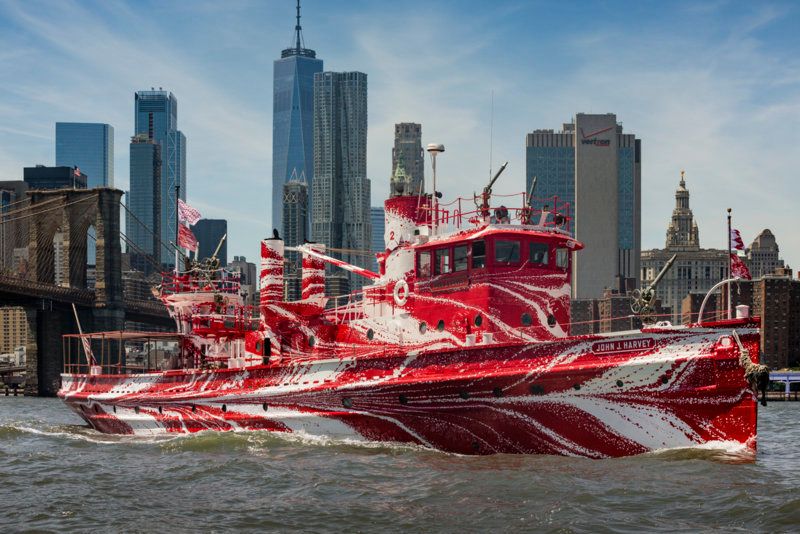 Photo by Nicholas Knight courtesy of Public Art Fund
Photo by Nicholas Knight courtesy of Public Art Fund
Flow Separation by New York artist Tauba Auerbach is a piece that converts the historic Fireboat John J. Harvey into what the Public Art Fund calls a “contemporary dazzle ship.” The concept of the “dazzle ship” dates back to World War I, when British painter Norman Wilkinson came up with the idea to strategically paint war ships in a way that created optical illusions that distorted the forms of the boats. Thus, they puzzled the soldiers on enemy ships who struggled to track the movements of the British ships.
2018 marks the anniversary of the end of World War I, and Auerbach’s installation prompts us to reflect upon this history. The piece evokes themes of innovation and abstraction, for Auerbach was inspired by the forms of objects as they move through water. She employed the method of transferring ink on water onto paper to achieve the pattern on the display boat.
Flow Separation will be on view through May 12, 2019 in various locations through New York Harbor.
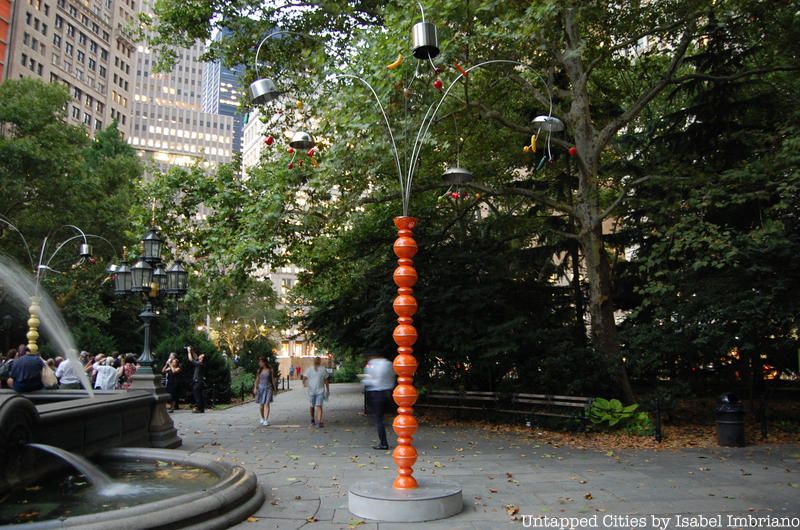
In August, Public Art Fund unveiled five new sculptures by New York artist B. Wurtz in City Hall Park, in an exhibition titled Kitchen Trees. Over the past 50 years, Wurtz has become well-known for working with objects that make up people’s basic needs, mainly objects that evoke themes of food, clothing, or shelter. In this installation, Wurtz expands this vision, taking everyday items like plastic bags, cans, shoelaces, and wood and arranging them in such a way that transforms this pile of objects into an art piece that “hovers between precarious fragility and formal monumentality.”
Specifically, the artist uses objects to create sculptures that resemble trees, from the trunks to the branches composed of kitchenware and plastic fruit. This installation is the first time that Wurtz has moved his work outside of the gallery, specifically to the urban landscape, where people and the built environment intermingle. The exhibit will be on view until December 7, 2018.

At 85 Broad Street, a building full of historical secrets if you know where to look, has installed an impressive piece of artwork on the sidewalks encircling the building in Lower Manhattan. It’s inspired by the 1767 map, “The Plan of the City of New York in North America” made by British military officer Bernard Ratzer from 1766 to 1767. Under this map, our readers may recall, there’s a yellow brick outline that marks the walls of Stadt Huys, the original city hall, one of many signs of Dutch New Amsterdam that still remain.
The map, designed by FXCollaborative, made by Jessup Manufacturing Company and printed by National Marker is made of a foil-backed proprietary material called Asphalt Art, and laid down piece by piece. Fun things of note on the map besides Stadt Huys and Lovelace Tavern, where you can still see the archaeological excavation of the tavern through glass, are the now-lost Princess Street, the old synagogue (original the old mill of Dutch New Amsterdam, home to the congregation of the Sephardic Jews who arrived in 1654 from Spain and Portugal), and the old slips of Lower Manhattan.
You can discover this and more on our tour of the Remnants of Dutch New Amsterdam!
Tour of The Remnants of Dutch New Amsterdam
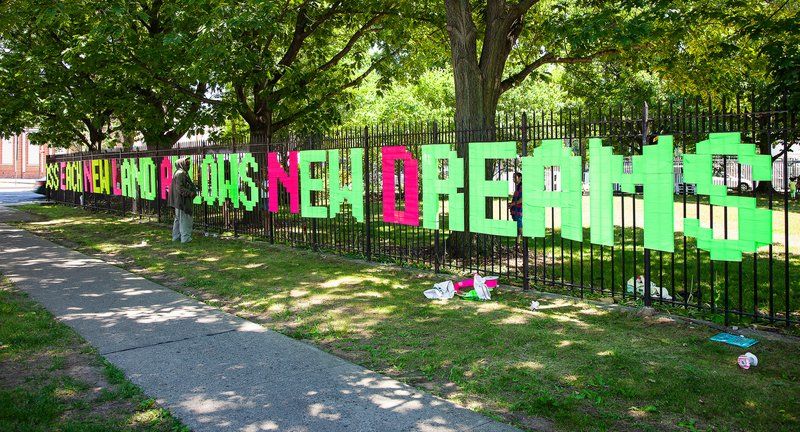
Photo courtesy of Michael Piña
Until next summer, Brooklyn Hi-Art! Machine’s artwork titled Fence Weaving will be on view at the Fidler-Wyckoff House Park as part of the Nou La- We Reach! exhibit. Fence Weaving, and the larger exhibit as a whole, immerses viewers in stories and artwork that highlight pairs of themes surrounding Caribbean migration: innovation and preservation, migration and displacement, and resistance and becoming. The exhibit showcases the stories of individuals from communities like Brownsville and East Flatbush to explore the ways in which the cultural fabric of Brooklyn has been shaped by migration.
Fence Weaving will be on view until June 15, 2019.
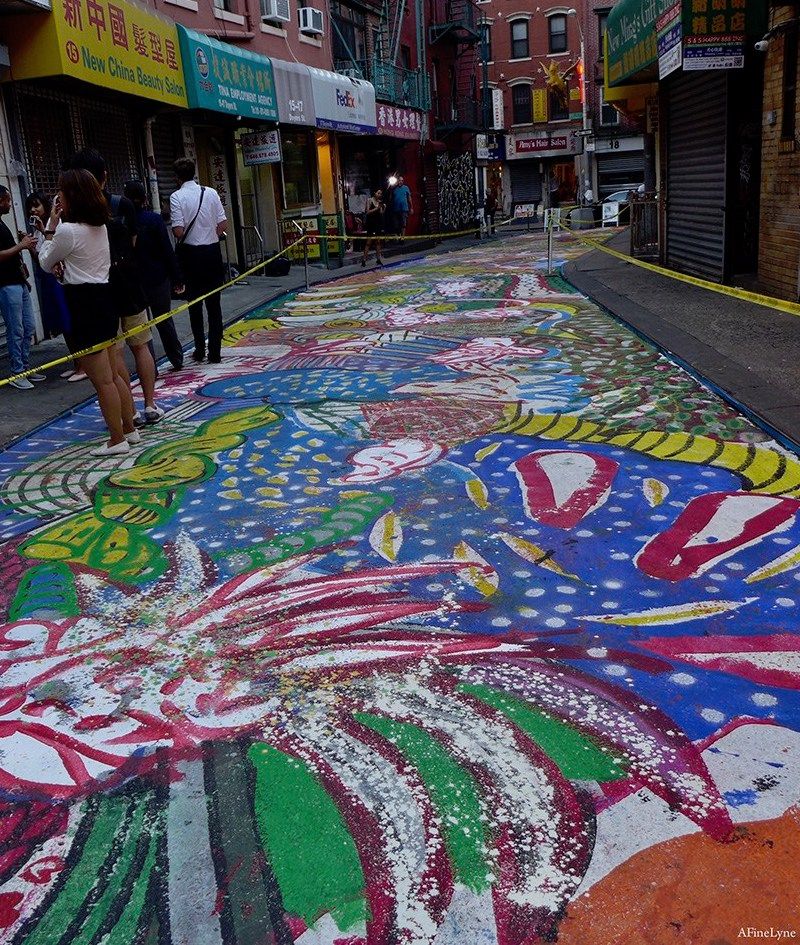
Photo courtesy of AFineLyne
Beginning August 1 and running through November 2018, Chinatown‘s Doyers Street will be blocked off from traffic between the hours of 10 am to 9 pm to create a pedestrian plaza. The highlight of the project will be an art piece titled The Song of Dragons and Flowers, artist Chen Dongfan’s almost 5,000 square-foot street painting that covers the street.
Dongfan was inspired by the history of Chinatown, which he describes as simultaneously being “full of hardship, but also full of love.” He evokes the immigrant experience, from cultural exchange to forging a place to call home, and utilizes the visual symbol of the dragon to represent the Chinese history that has shaped the neighborhood, tumultuously in some cases, and continues to endure to this day.
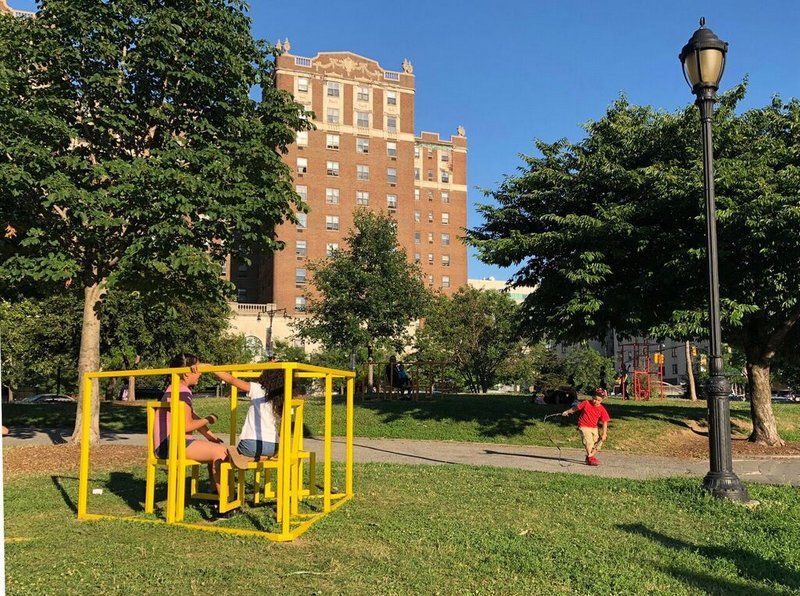
Photo by Dionisio Cortes Ortega courtesy of NYC Parks
Last month, Sitting Together, created by artist Dionisio Cortes Ortega, opened to the public in the Bronx’s Joyce Kilmer Park as part of the UNIQLO Parks Expression Grant program. Purposely placed by the neighboring Bronx Supreme Courthouse, the installation subverts the established proceedings of courtroom cases, prompting viewers to consider the ways in which conflicts, whether between individuals or the law, are resolved in a systemized manner that oftentimes doesn’t encourage empathy and understanding. The sculptures place the plaintiff and defendant within modified witness stands to encourage these qualities of empathy and understanding. Furthermore, the color and seating direction in each sculpture addresses the severity of the conflicts.
Sitting Together will be on view until July 1, 2019.
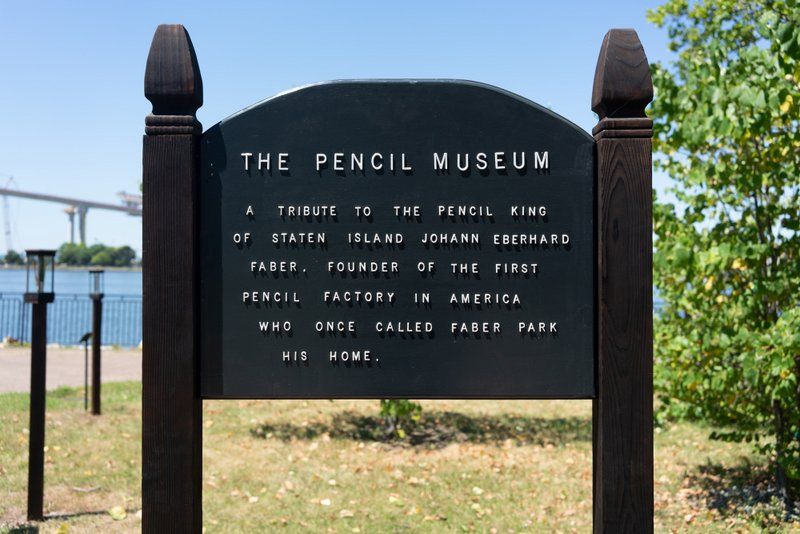
Photo by Jackie Mock courtesy of NYC Parks
On Staten Island’s Faber Park, artist Jackie Mock has installed The Pencil Museum, an exhibit that educates viewers about a somewhat obscure slice of New York history. Featuring hand-crafted cases that display antique pencils and writing instruments, the piece pays homage to the influential Eberhard Faber Pencil Company. When it was founded, the factory was the only one of its kind in America, and eventually created one of the most commonly used goods, all manufactured in New York. Faber Park was once the site of Faber Mansion, the property of entrepreneur Johann Eberhard Faber, the “Pencil King of Staten Island”. The Pencil Museum will be on view until June 30, 2019.
Fun fact: the Eberhard Faber Pencil Company Historic district in Greenpoint, Brooklyn is one of the smallest in New York City, and more information can be found on our list of the 10 Smallest Historic Districts in NYC.
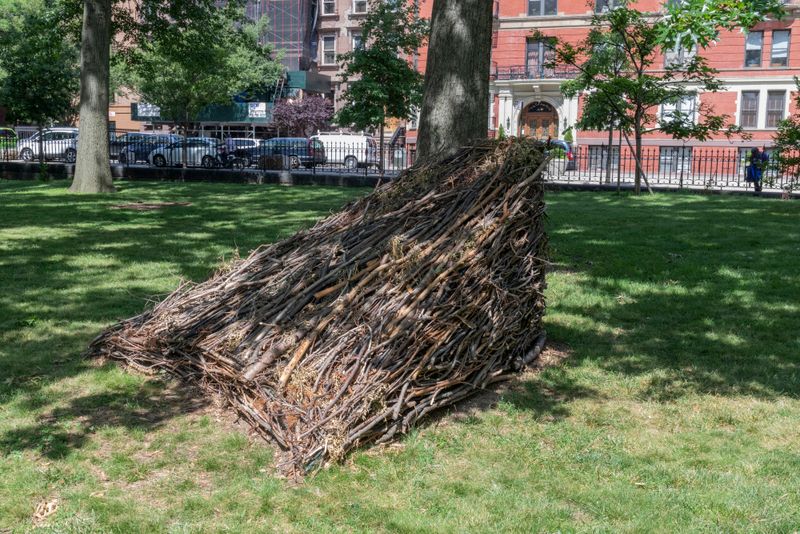
Photo by Adam Reich courtesy of the artist and Susan Inglett Gallery
Maren Hassinger: Monuments is an installation in Marcus Garvey Park and sponsored by the Studio Museum in Harlem that runs from through July 10, 2019. The exhibition features eight site-specific sculptures by artist Maren Hassinger who used branches to create sculptural forms that evoke aspects of the park landscape, like an oval near the pool, for instance.
Because she is a Harlem-based artist, Hassinger has been associated since the Studio Museum since the 1980s. With Monuments, she took great care to make it “a project made in Harlem and for Harlem.” Specifically, she created the works with volunteers from the Studio Museum’s Teen Leadership Council and the Expanding the Walls program.

Image courtesy of James and Karla Murray
James and Karla Murray’s exhibit Moms-and-Pops of the L.E.S. is part of 10 Uniqlo Park Expressions that are on view across the city. This piece is a pop-up that debuted last month in Seward Park on the Lower East Side. Moms-and-Pops is a life-sized structure that displays four large photographs of mom-and-pop ships that have closed in the Lower East Side, such as Cup & Saucer and Chung’s Candy & Soda Stand.
The installation seeks to highlight the disappearance of small businesses like bodegas, coffee shops, luncheonettes, delis, and newsstands that used to be numerous in the Lower East Side. The artists state that the piece seeks to represent the “small businesses that were common in the Lower East Side and helped bring the community together through people’s daily interactions.”
A combination of metal and wooden materials makes the sculpture weather-proof and capable of lasting the entire year, perhaps a nod to the legacy of these now extinct businesses of the Lower East Side.
Moms-and-Pops of the L.E.S will be on view until June 19, 2019.
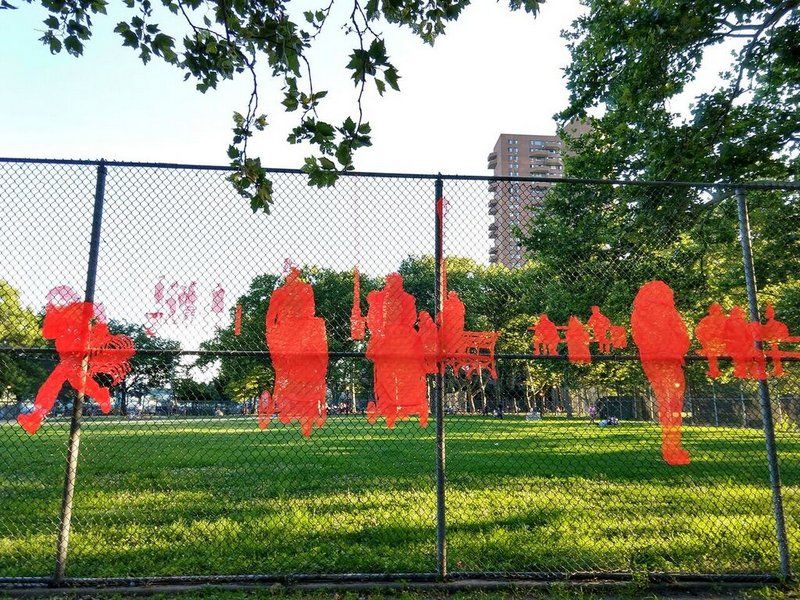
Photo by Harumi Ori courtesy of NYC Parks
From now until July 9, 2019, Harumi Ori’s I Am Here will be on view in East Harlem’s Thomas Jefferson Park. The artist states that the sculptures are inspired by a poem by Japanese poet Michio Mado, which advances the idea that meaning can be found in existing in everyday life. Ori began the project by taking a photo of an ordinary location every day from the same viewing position and at the same time. She was inspired by the photos which each exhibited unique variations, despite the fact that the conditions in which the photo were taken were held constant.
The installation consists of orange industrial mesh that the artist folded and sewed to create a three dimensional portrait of the park in a way that mirrors the shapes and motions of the people and inanimate objects that fill the park.
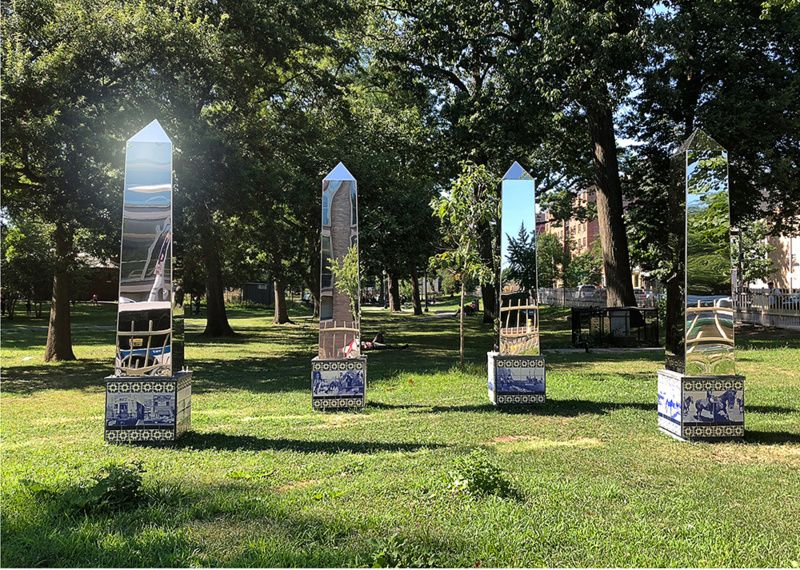 Photo by Rose DeSiano Courtesy of New York City Department of Parks & Recreation
Photo by Rose DeSiano Courtesy of New York City Department of Parks & Recreation
Rose DeSiano’s Absent Monuments, also part of the UNIQLO Parks Expressions Grant, is on view in Queens’ Rufus King Park until June 2019. The installation is constructed of several mirrored obelisks that feature Dutch Delft photographic tiles that explore the history of the park, as well as floral tiles inspired by Native American patterns. The mirrored surfaces confront the viewer with their reflection and subtly prompt them to reflect on their own identity and their situation within the history of Jamaica, Queens, which is full of colonization, war, abolitionism, immigration, and rural urbanization. Simultaneously, the tiles pay homage to the history of Native American people and address the patterns of cultural displacement that have occurred in Queens.
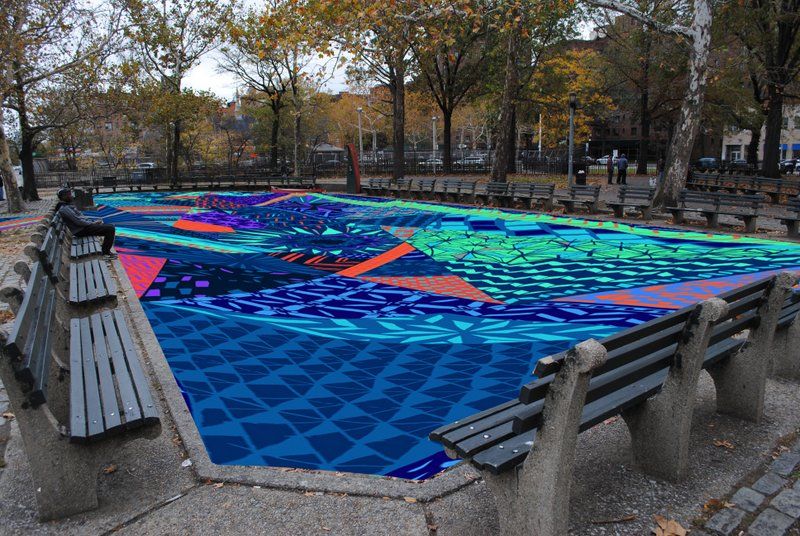
Courtesy of NYC Parks
An installation by artist Cara Lynch titled I’m So Happy You’re Here has just debuted at Virginia Park in the Bronx as part of the UNIQLO Park Expressions Grant program. Lynch has created numerous public art projects, which include pieces here in New York. A common theme throughout her work is that of tension; in I’m So Happy You’re Here, she explores tensions between high and low and the contrast of public and private space. The mural, which is painted on the ground, contains patterns that are reminiscent of traditional parquet flooring, a status symbol found in the homes of wealthy individuals.
I’m So Happy You’re Here will be on view until July 19, 2019.
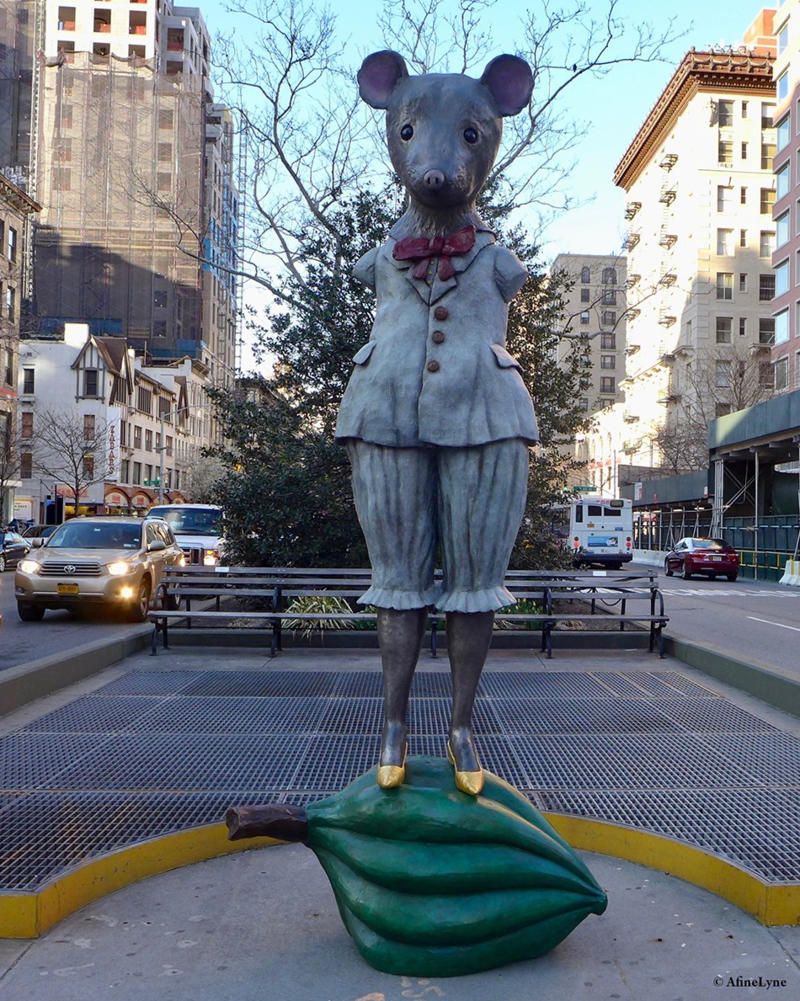
‘Ms. Mighty Mouse’ on 79th Street; Photo by Lynn Lieberman/Gotham to Go
The Broadway Mall Association debuted Kathy Ruttenberg on Broadway: In Dreams Awake. The exhibit includes six works featured on the Broadway center mediums, located on 64th, 72nd, 79th, 96th, 117th, and 157th Streets.
Each sculpture — described as a combination of human, animal and plant forms — is made from cast silicon bronze, and range between 6 feet to 15 feet in height. (Some even feature LED lighting!) The sculptures take inspiration for their surroundings; for instance, Ms. Mighty Mouse on 79th Street dreams of the cheese at nearby Zabar’s and All the World’s a Stage, which depicts a singing figure, is an allusion to the nearby Lincoln Center.
The exhibit will be on view through February 2019.
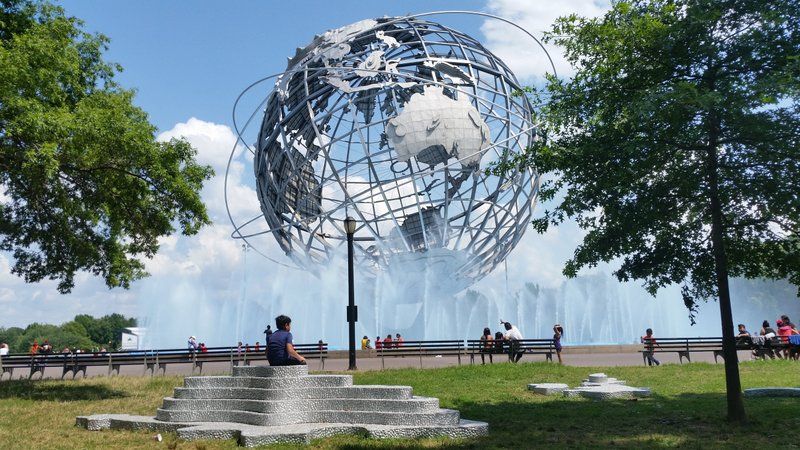
Photo courtesy Zaq Landsberg via NYC Parks
Around the Unisphere in Flushing Meadows Corona Park sit the sculptures that comprise Zaq Landberg’s Islands of the Unisphere (yet another of the UNIQLO Parks Expressions Grant program). The Unisphere monument, a fixture of the park, is a large sculptural globe with recognizable land masses, but without labels and borders. Landberg expanded on this famed monument by choosing islands off of the Unisphere, recreating them at scale, and placing them horizontally on the grass. The islands act as seating, stages, and meeting places, community spaces that encourage people to forge connections and reflect on the tremendous diversity of Queens.
Unisphere will be on view until June 10, 2019.
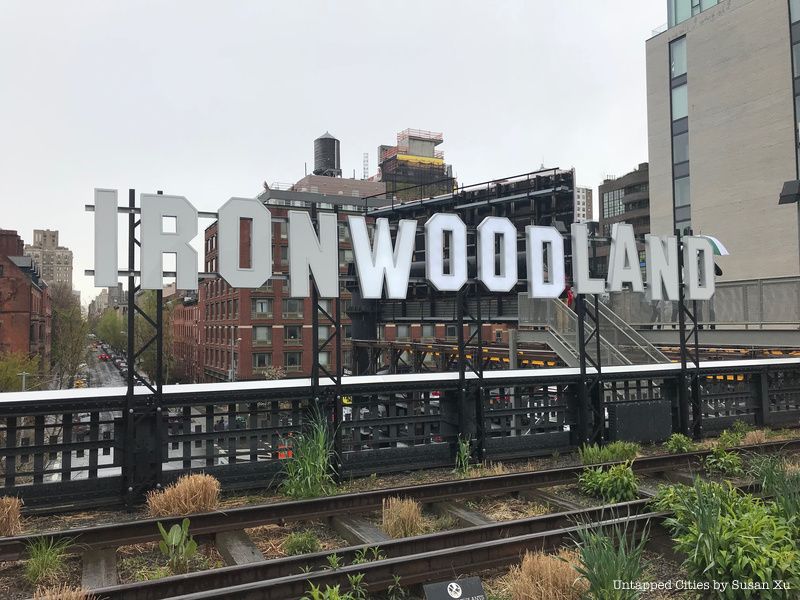
AGORA on The High Line is an outdoor group exhibition by nine artists explores the role of art and artists in defining, creating, and using public space. The name of the exhibit is inspired by the same ancient Greek word, which literally translates to a gathering place — a fitting name as New York City’s public spaces have served as a home to a plethora of artworks over the decades, ranging from WPA murals to graffiti tags.
AGORA will focus on the power of art to change society. As such, it addresses current issues, including women’s rights, mass incarceration, the environment and immigration. For instance, the work above, “C.R.E.A.M.,” by Sable Elyse Smith, is an altered replica of the Hollywood Sign that reads IRONWOODLAND — a reference both to the Ironwood State Prison and to “Hollywoodland,” the segregated real estate development that was advertised by the original sign. The exhibit will be on view until March 2019 at various locations along The High Line.
Next, check out The Top 10 Secrets of the High Line.
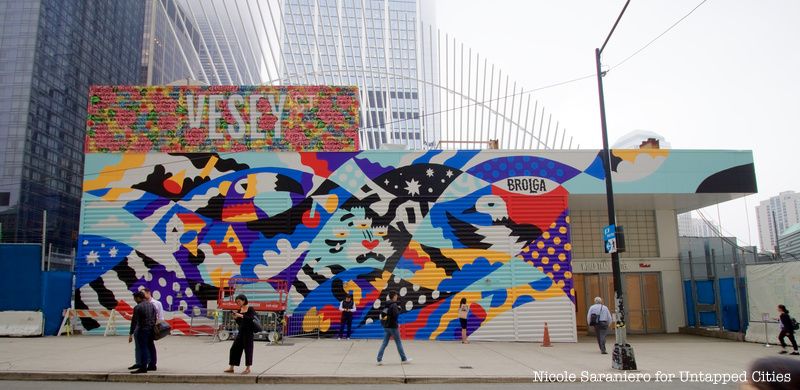
Vesey mural by Chinon Maria and Sebastian Mitre
While construction of 2 World Trade is on hold, a collection of corrugated metal sheds housing mechanical equipment have been spruced up by artists from around the world to make the area look less like a construction zone and more like a hip pedestrian throughway. The sheds, which are bounded by Greenwich, Vesey and Church Streets and the Oculus transportation hub, feature murals by Australian illustrator Brolga, Los Angeles-based artist Todd Gray, Korean-born Joohee Park, aka Stickymonger, the husband and wife team of Chinon Maria and Sebastian Mitre, Japanese-born, New York resident Riiisa Boogie, and Bronx native Hektad. When all of the murals are complete there will be 8 colorful works to see!
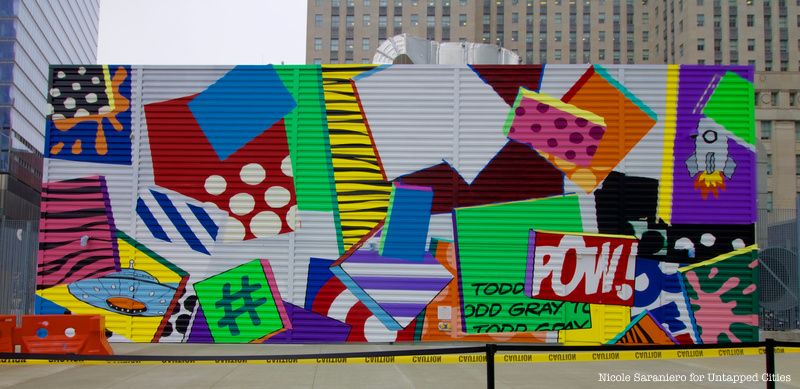
Mural by Todd Gray
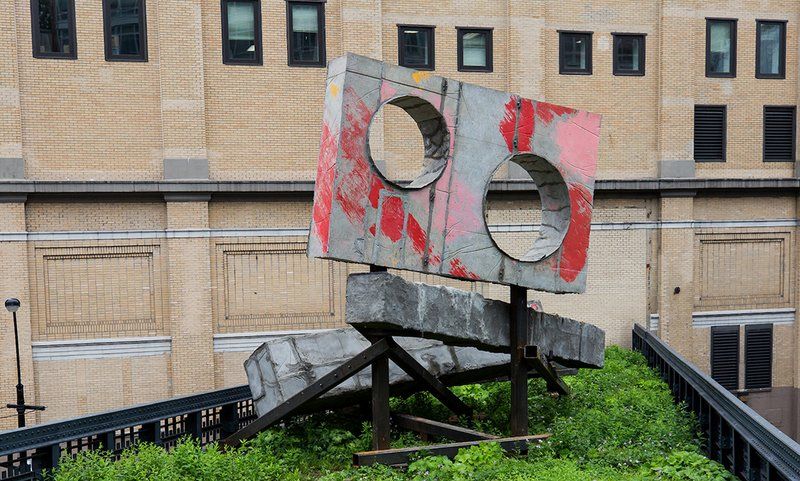
Phyllida Barlow’s prop. Photo via the High Line
In addition to the Agora commissions we featured the last few months, the High Line launched two new installations at the end of May. Kerry Tribe’s Exquisite Corpse is a film that follows the entire 51-mile length of the Los Angeles River chronicling “the river’s neighbors—animal, human, and vegetal—and their stories with one minute devoted to each mile,” according to High Line Art. The film plays daily on The High Line at 14th Street at dusk from May 14 to July 18, 2018.
Then, Phyllida Barlow’s prop is a teetering concrete sculpture, reimagined from a work displayed at the 2017 Venice Biennale, and the first work to be displayed on the Northern Spur Preserve of the High Line at 16th Street, a section that once connected directly to a refrigerated warehouse that was part of the Nabisco cookie factory. Prop will be on view until March 2019.

During NYCxDesign Week, we were honored to be a partner of The Design Trust for Public Space in the launch of El-Space, a long-term pilot installation located under the Gowanus Expressway in Sunset Park at 36th Street and 3rd Avenue, just adjacent to Industry City. El Space is the product of a five year, critical exploration in how New York City can better activate the forgotten, unfriendly spaces beneath aging elevated infrastructure and culminates in this first pilot installation that showcases what an alternative walkway beneath the Gowanus Expressway could look like.
El-Space was designed with input from the diverse local community through charettes and on-site pop-up workshops, including work with students at Sunset Park High School and members of a Community Advisory Board.The design tests strategies for lighting, green infrastructure, and urban design for replicability, aesthetics, and of course, how the public uses and engages with it. El-Space will be installed for about a year, used to test and refine strategies for future permanent activations. For the passerby, it’s a cool visual addition to an industrial space and for the community, it has created a new meeting spot.
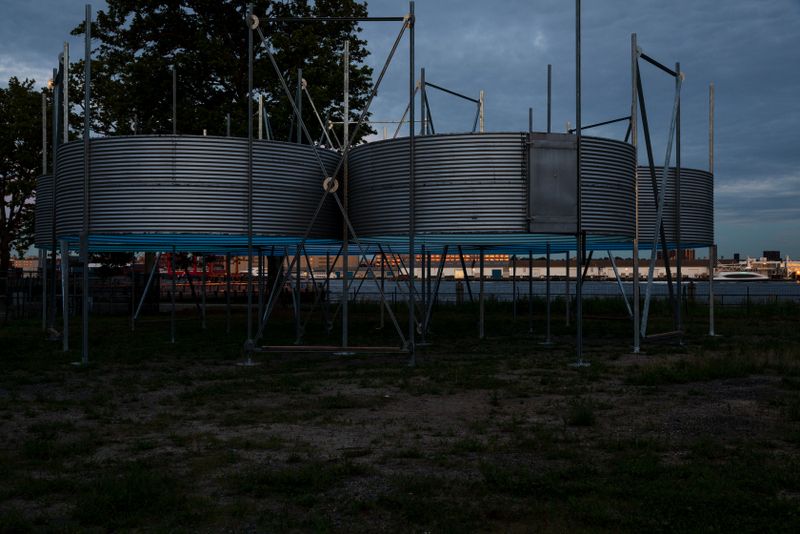
Photo by Lindsey Hadlock courtesy of Cornell University
Oculi, the winning piece of the 2018 City of Dreams competition, was unveiled on Governor’s Island in late June and will be on view through the fall. The City of Dreams competition encourages architects and designers to turn their visions and creativity towards sustainability and ponder environmental problems such as the depletion of resources.
The piece is constructed of discarded grain silos that are elevated to create a variety of shadow patterns, creating an art piece while evoking the imagery of New York’s industrial age. Sustainability is not just present in the construction of the piece, but also in its demolition, in which the the silos are projected to be repurposed for components of experimental housing.
 Photo by Alexander Atkins, courtesy of the artist
Photo by Alexander Atkins, courtesy of the artist
In July, Tribeca Park unveiled artist Rebecca Manson’s first public sculpture, a monumental public art piece titled Come Closer and the View Gets Wider. The piece consists of thousands of handmade, glazed porcelain parts that are fused together to create a magnificent eight-foot orb.
As the title and the composition of the piece suggests, the perspective at which the piece is viewed impacts the viewer’s perception. Each of the thousands of hand-crafted parts appear rather insignificant on their own and from afar, appear to blend in to the seamless piece. Collectively, the small pieces are crucial to creating the whole piece, which stresses the impact of small things coming together to create something greater. The work will be on display until July 2019.
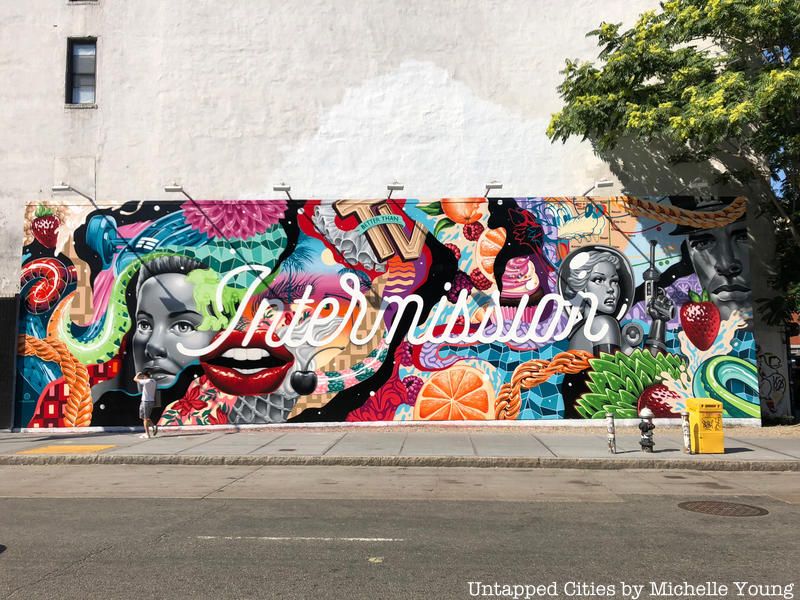
In July, acclaimed street artist Tristan Eaton completed work on a mural on the Houston/Bowery Wall, prompting much anticipation for the finished piece. The mural combines images and themes from cinema and pop culture, evoking the nostalgia of the cinematic Manhattan, where beauty and grunge simultaneously existed in the age of matinees and showgirls.
A notable detail of the mural is present in the background details. In the upper right corner of the piece a subway map is depicted in which notable street artists are listed as stops on the map, including Tats Cru, Crash, Futura, Daze and more.
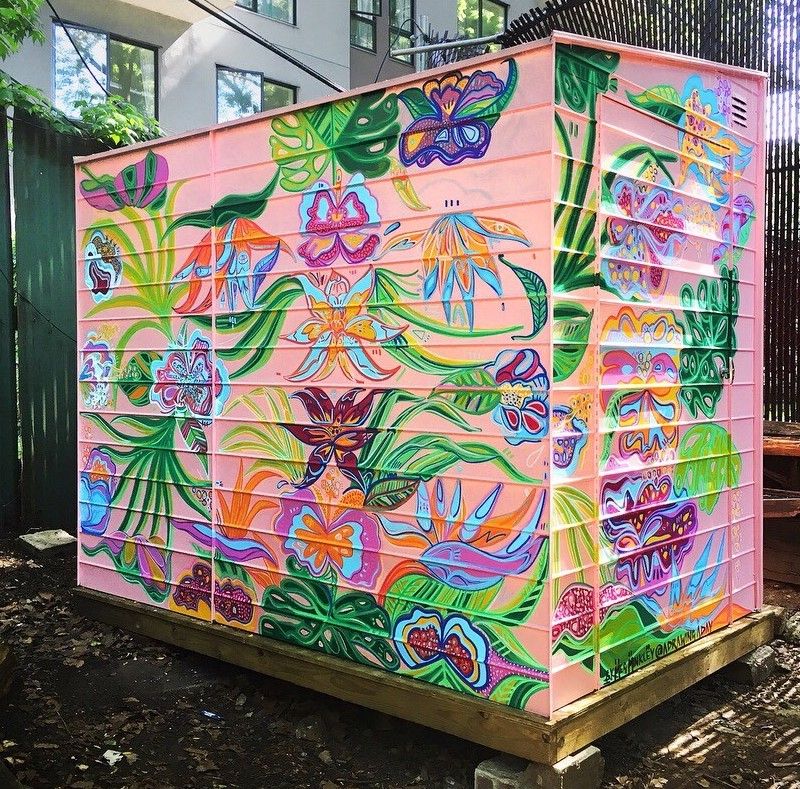
Meg Minkley’s ‘Fiesta Forever’; Photo by Meg Minkley courtesy of NYC Parks
Evan Bishop’s Hip-Hop for Hope! and Meg Minkley’s Fiesta Forever are two projects that are part of NYC Parks GreenThumb’s Art in the Gardens Shed Murals project. A project within GreenThumb’s community gardening program, which consists of over 550 community gardens, it brings local artists to community gardens to showcase their art on sheds that will be used by the gardens.
Minkley’s Fiesta Forever, located in Brooklyn’s Powers Street Garden, features illustrations of a variety of flowers that bloom throughout the city throughout the spring and summer seasons. Evoking the “re-birth of color in the city”, the vibrant illustrations and cheerful pink background encourage viewers to celebrate the fun activities and excitement of summer.
Bishop’s Hip-Hop for Hope! in the Latinos Unidos Garden located in the Bronx, is influenced by the artist’s upbringing in the Bronx during the ’70s and ’80s, where he was constantly surrounded by hip-hop. For this project, he worked with artists from ArTech, who placed their own artwork on the shed with words such as “unity” and “hope”. ArTech is supported by the AHRC, a New York organization committed to helping individuals with disabilities receive services related to work, family, and more.
The installations will be on view until June 14, 2019.
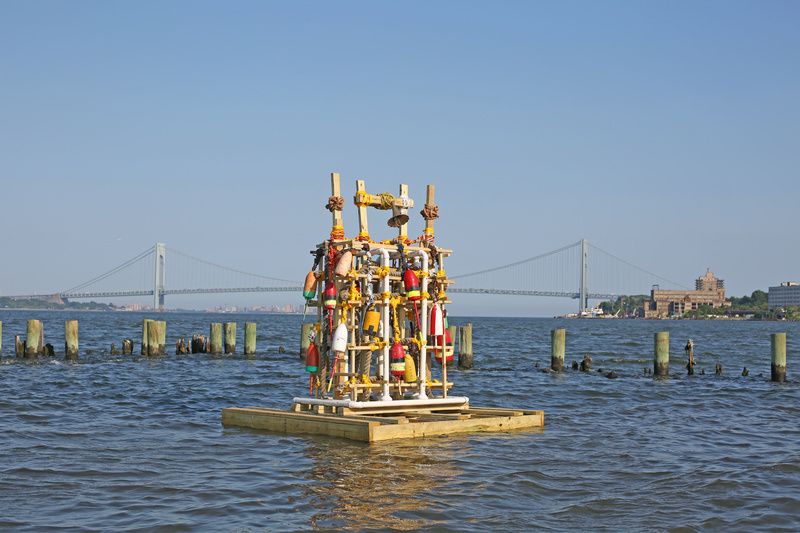 Photograph courtesy of Design Trust for Public Space
Photograph courtesy of Design Trust for Public Space
Sonic Gates is a public art installation that features a series of eight sound sculptures and murals in Staten Island placed along the waterfront, on Bay Street, and in Tappen Park. The installation is part of a larger project titled Future Culture: Connecting Staten Island’s Waterfront by the Design Trust for Public Space in partnership with Staten Island Arts.
Works include the piece in the photograph above, which was made by Arthur Simms and is on display in the harbor off the Stapleton Esplanade, and a piece by DB Lampman, on display in Tappen Park, which consists of an assemblage of wind chimes that hang over the head of its viewers and encourages them to engage with the piece using senses besides sight.
“The Future Culture pilots will highlight our borough’s rich cultural assets, from the Bay Street commercial corridor bustling with restaurants, stores and art centers, to Parks locations where dynamic community activities are taking place, to the spectacular waterfront, where we are reflecting Staten Island’s deep maritime heritage,” said Elizabeth Bennett, Executive Director at Staten Island Arts.
Akin to the Design Trust for Public Space’s initiatives to reactive underutilized spaces under elevated highways (to be covered later in this article), this initiative looks to “inspire Staten Islanders and visitors to walk the underused pathways and unleash new possibilities for regenerating public spaces as a valuable community asset,” said Susan Chin, Executive Director, Design Trust for Public Space.
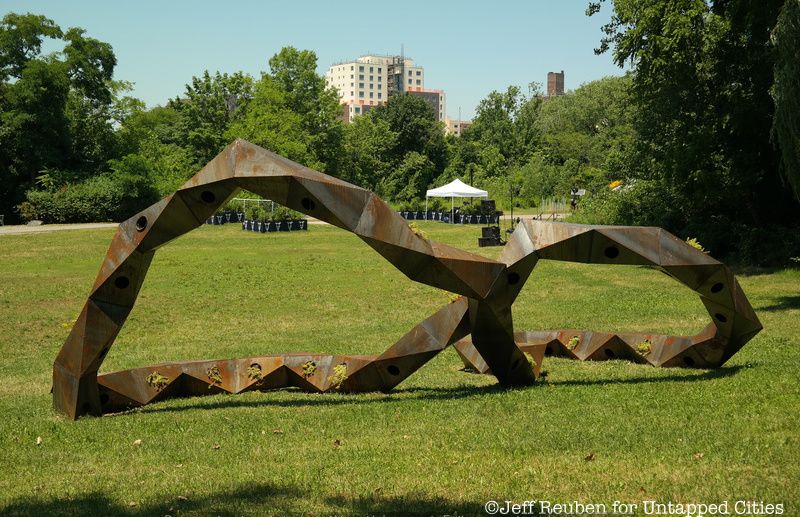
River Rising/Sube el Rio: An Exposition of Science, Art and Technology is an outdoor public art sculpture exhibition in Starlight Park in the Bronx. The exhibit opened on June 30, in a weekend of parades, dancing, and live music to celebrate the revitalization of the Bronx River and Starlight Park.
The installation is composed of eight large-scale public art sculptures by various artists curated by the Bronx River Art Center. The sculptures are meant to be enjoyed as “modern pavilions” that can be utilized as public community spaces. The sculptures pay homage to the 1918 Bronx International Exposition of Science, Arts and Industries.
The installations will be on view until June 29, 2019.
Subscribe to our newsletter